

How To Start a Yacht Charter Business
Main Sections In This Post Steps To Starting A Yacht Charter Business Points to Consider Knowledge Is Power Featured Video
In this post, you’ll find a step-by-step guide to starting a yacht charter business.
In addition, we will give you an overview of what you can expect from operating a yacht charter business and help you make better decisions and gain clarity.
You can access the latest resources in our “Knowledge Is Power” section, which can be used during the startup phase and once your yacht charter business is fully operational.
There is an abundance of information available to explore. If you like this post, consider sharing it with others and bookmarking it for future reference.
Let’s get started with the steps.
The Steps to Start Your Yacht Charter Business
Below are the steps to starting a yacht charter business.
Each step is linked to a specific section, allowing you to jump to your desired section or scroll to follow the steps in order.
- An Overview of What You’re Getting Into
- Yacht Charter Business Overview
- Researching Your Yacht Charter Business
- Looking Startup and Operating Costs
- Creating Your Mission Statement
- Creating A Unique Selling Proposition (USP)
- Choose a Yacht Charter Business Name
- Register Your Company
- Create Your Corporate Identity
- Writing a Business Plan
- Banking Considerations
- Getting the Funds for Your Operation
- Software Setup
- Business Insurance Considerations
- Supplier and Service Provider Considerations
- Setting Your Prices
- Physical Setup
- Creating a Website
- Hiring Employees
- Getting Customers Through the Door
1. An Overview of What You’re Getting Into
It is essential to have a strong understanding of what you’re getting into. The more you know what to expect, the better your decisions will be and the fewer surprises you’ll encounter.
Before starting your yacht charter business, there are many points to consider, the pros and cons of owning and operating your business, how passionate you are about your business, getting the right advice, and more.
When you consider these crucial points, you’ll better understand what you are getting into and can avoid many problems you could encounter if you bypass these issues.
Take the time to look at these considerations from the following link before starting your business, and you will gain the information to help you make the right decisions.
See our page on Critical Points to Consider before starting your business.
2. Gaining an Overview of Owning a Yacht Charter Business
Next, let’s discuss the issues that will give you an overview of what to expect from owning and running a yacht charter business.
In this step, we will be looking at the following sections:
a.) A Quick Overview of Owning a Yacht Charter Business b.) Yacht Charter Business Models c.) Challenges You Could Face When Starting and Operating a Yacht Charter Business
a.) A Quick Overview of Owning a Yacht Charter Business
A yacht charter business offers individuals or groups the opportunity to rent or lease yachts for specified durations, typically for recreational purposes such as cruising, fishing, or hosting events.
These businesses provide access to a fleet of yachts ranging from small vessels to luxury superyachts, catering to various preferences and budgets.
Day-to-Day Tasks in Running a Yacht Charter Business
Client Liaison and Booking Management:
- Communicating with potential clients to understand their requirements.
- Providing information on available yachts, pricing, and booking procedures.
- Managing bookings, including contracts, payments, and scheduling.
Maintenance and Upkeep:
- Overseeing regular maintenance tasks to ensure the yachts are in optimal condition.
- Coordinating repairs and servicing as necessary, often involving external contractors.
- Conducting inspections to address any issues promptly and maintain safety standards.
Crew Management:
- Hiring, training, and supervising crew members, including captains, deckhands, and chefs.
- Ensuring compliance with maritime regulations and safety protocols.
- Managing crew schedules and assignments for each charter.
Marketing and Promotion:
- Developing marketing strategies to attract new clients and retain existing ones.
- Utilizing online platforms, social media, and targeted advertising to reach potential customers.
- Collaborating with travel agencies, event planners, and other industry partners for promotional opportunities.
Financial Management:
- Budgeting and financial planning to optimize revenue and control expenses.
- Monitoring expenses related to fuel, maintenance, insurance, and other operational costs.
- Tracking bookings, payments, and invoices for accurate financial reporting.
Customer Service and Satisfaction:
- Providing exceptional customer service throughout the charter experience.
- Addressing client inquiries, concerns, and special requests promptly and professionally.
- Seeking feedback and reviews to continually improve service quality.
Regulatory Compliance:
- Staying informed about maritime laws, regulations, and licensing requirements.
- Ensuring compliance with safety, environmental, and operational regulations.
- Obtaining necessary permits and certifications for yacht operations.
In conclusion, running a yacht charter business involves a diverse range of tasks, from client management and maintenance to marketing and regulatory compliance. Success in this industry requires meticulous planning, attention to detail, and a commitment to delivering exceptional service to clients.
b.) Yacht Charter Business Models
Fleet Ownership:
- Acquiring a fleet of yachts either through purchase or long-term lease agreements.
- Directly managing all aspects of yacht maintenance, crew hiring, and client bookings.
Fractional Ownership:
- Offering clients the opportunity to purchase a share of a yacht, granting them access for a specified period each year.
- Shared responsibility for maintenance and operational costs among multiple owners.
Brokerage Model:
- Acting as an intermediary between yacht owners and clients, facilitating charter agreements for a commission fee.
- Minimal overhead costs as the business does not own or maintain the yachts directly.
Membership Clubs:
- Providing members with access to a fleet of yachts in exchange for membership fees.
- Offering various membership tiers with different levels of access and benefits.
Event Chartering:
- Specializing in chartering yachts for events such as weddings, corporate gatherings, or special occasions.
- Tailoring services to meet the specific needs of event organizers and attendees.
Luxury Experiences:
- Focusing on high-end clientele by offering luxury yacht charters with premium amenities and personalized services.
- Emphasizing exclusivity and exceptional experiences to justify premium pricing.
Conclusion: Choosing a suitable business model from the beginning is crucial, as switching your model later is more challenging.
Focusing on a niche allows you to adapt your products and services to a specific group of customers. Consider becoming a specialist instead of trying to be a business that offers everything to everyone.
Identifying a business model that feels right to you is essential and can give you a better chance of succeeding.
c.) Challenges You Could Face When Starting and Operating a Yacht Charter Business
Challenges During the Startup Phase of a Yacht Charter Business
Capital Investment:
- Acquiring yachts, securing permits, and setting up infrastructure require substantial initial investment.
- Limited access to funding sources or high upfront costs can hinder business launch.
Market Competition:
- Established players in the industry may already have strong brand recognition and customer loyalty.
- Differentiating the new business and attracting clients amidst competition can be challenging.
- Navigating complex maritime regulations, licensing requirements, and safety standards demands time and expertise.
- Failure to comply with regulations can result in legal consequences and reputational damage.
Crew Recruitment and Training:
- Finding qualified crew members, including captains, deckhands, and service staff, can be difficult.
- Providing comprehensive training to ensure crew competency and adherence to safety protocols is essential.
Marketing and Brand Building:
- Building awareness and visibility in the market requires strategic marketing efforts.
- Developing a strong brand identity and effective promotional strategies to attract clients is crucial.
Challenges During Operation of a Yacht Charter Business
Seasonal Demand Fluctuations:
- Demand for yacht charters may vary significantly depending on seasonal factors and regional trends.
- Managing cash flow and operational expenses during offseason can be challenging.
Maintenance and Repairs:
- Regular maintenance and unexpected repairs are inevitable in yacht operations.
- Balancing maintenance schedules to minimize downtime while ensuring safety and operational efficiency is critical.
Customer Satisfaction and Retention:
- Maintaining high service standards and exceeding customer expectations is essential for repeat business.
- Addressing customer complaints and feedback promptly to preserve the business’s reputation.
Economic Instability:
- Economic downturns or geopolitical uncertainties can impact discretionary spending on luxury experiences like yacht charters.
- Implementing contingency plans and diversifying revenue streams can mitigate the effects of economic volatility.
Operational Efficiency:
- Streamlining processes and optimizing resource allocation to maximize profitability.
- Managing logistical challenges such as fuel consumption, docking fees, and itinerary planning efficiently.
In conclusion, navigating the challenges of both the startup phase and ongoing operation of a yacht charter business requires careful planning, adaptability, and a commitment to delivering exceptional service to clients.
3. Research
Quality information plays a significant role in achieving success.
Continuous research is vital. The more you know, the easier it is to operate your business.
a.) Demand, the Competition and Your Location b.) Target Audience
a.) Demand, the Competition and Your Location
Determining the demand for your products and services before starting your yacht charter business is essential. Offering high quality and reasonable prices is not enough.
There must be enough demand for what you plan to offer, or opening your business doesn’t make sense.
A lack of demand will lead to closing before you see any success, and you could have a mountain of debt that’s challenging to repay.
Market Saturation:
In addition to market demand, you need to consider if the market is saturated with what you plan to offer.
With a saturated market, gaining market share won’t be easy unless you offer something your competitors don’t.
You also need to consider if the competition could easily copy your idea. If so, competitors are already established, so they could take most of the market share for your idea.
Competition:
When looking at the competition, focus on what you are up against. Understand your competition, what they provide and their strengths and weaknesses.
You may be able to bring something new to the marketplace instead of just going head-to-head with the competition. Understanding what you are up against is crucial when starting a new business.
Choosing Your Location:
Ideally, you should focus on a location that balances sufficient demand with a manageable level of competition. Moreover, affordability is another crucial consideration.
While a highly populated area might provide greater exposure, you must ensure that the increased expenses won’t outweigh your profits.
Opting for cheaper rent may seem tempting, but you must ensure the location has enough customers to provide enough revenue for your yacht charter business to be profitable and survive.
In conclusion, choosing the right location with balanced supply and demand is crucial for your business’s success. Take the time to thoroughly research and analyze potential locations to make an informed decision.
For more, see the Demand for Your Products and Services and Choosing The Best Location for Your Business.
b.) Target Audience
Understanding your target audience is crucial for the success of your yacht charter business.
Here are the key benefits:
- Tailored Products and Services: By comprehensively understanding your target audience, you can tailor your products and services to meet their specific needs and preferences. This customization increases the likelihood of customer satisfaction and loyalty.
- Efficient Resource Allocation: Knowing your target audience enables you to allocate resources more efficiently. Instead of investing in a broad range of products and services, you can focus your resources on areas that are most relevant and valuable to your customers, optimizing your operational efficiency.
- Effective Marketing Strategies: A deep understanding of your target audience allows you to develop more targeted and effective marketing strategies. You can tailor your messaging, channels, and promotions to resonate with your audience, maximizing the impact of your marketing efforts and increasing customer acquisition.
- Improved Customer Relationships: When you understand your target audience, you can build stronger and more meaningful relationships with your customers. By anticipating their needs and preferences, you can deliver personalized experiences and exceptional customer service, fostering long-term loyalty and advocacy.
Target Market Ideas:
- Luxury travelers seeking exclusive experiences
- Corporate clients looking for unique team-building or client entertainment opportunities
- Couples searching for romantic getaways or honeymoon experiences
- Event planners organizing weddings, parties, or corporate events
- Tourists interested in exploring coastal destinations through yacht excursions
- Fishing enthusiasts seeking offshore fishing adventures
- Business executives in need of private transportation for meetings or events
- Travel agencies catering to high-end clientele
- Resort and hotel operators looking to offer yacht charter packages to guests
- Concierge services providing luxury experiences to affluent clients.
4. Looking Startup and Operating Cost:
Understanding the financial aspect of your business and making good decisions based on the facts are crucial factors in succeeding.
You will struggle to manage a successful operation without investing the time and effort necessary to understand the financials of your yacht charter business.
This section has a lot to cover, and these are critical steps in starting and operating your business.
The section is broken up into the following:
a.) Start-up Cost:
In this step, we will look at the importance of getting accurate estimates and a simple list to help you understand your needs.
b.) Monthly Expenses:
Expenses must be monitored, or the operation could be jeopardized. A sample list of monthly expenses is provided, which can be used to generate ideas for your setup.
c.) Best Practices
Well take a look at what you can do to ensure you are always on top of the financial well being of your operation.
Let’s get started!
a.) Start-Up Costs:
Accurately estimating startup costs is crucial for a smooth planning process and successful opening. Underestimation can lead to financial issues, while overestimation may deter potential investors due to perceived high risk.
Factors influencing costs include business model, operation size, location, employee hiring, equipment purchase, and rental expenses.
Begin by listing all necessary items and researching prices. Additional expenses may emerge during research, so be thorough.
Sample estimates can provide insights, but exact costs vary due to individual setups. Each business has unique variables, making it essential to conduct comprehensive research for accurate estimates.
This process determines the viability of starting a yacht charter business.
Sample List: Startup Costs for a Yacht Charter Business
The purpose of the list below is to focus on the items more than the numbers because these are general samples, and your figures will be different.
Yacht Purchase or Lease:
- Upper Value: $500,000
- Lower Value: $300,000
Licensing and Permits:
- Upper Value: $10,000
- Lower Value: $5,000
- Upper Value: $15,000
- Lower Value: $10,000
Marketing and Advertising:
- Upper Value: $20,000
Website Development and Online Presence:
- Lower Value: $8,000
Equipment and Supplies:
- Upper Value: $25,000
- Lower Value: $15,000
Office Space Rent or Lease:
Utilities and Office Setup:
- Upper Value: $8,000
- Lower Value: $4,000
Legal and Professional Fees:
Miscellaneous Expenses (Contingency):
Grand Total (Upper Value): $648,000
Grand Total (Lower Value): $380,000
For more, refer to our article on Estimating Startup Costs.
b.) Monthly Operating Costs:
Monthly Expenses for a Yacht Charter Business
Your monthly expenses mirror the startup costs discussed previously and are subject to various variables. Factors such as business structure and staffing, as well as location, significantly impact monthly expenditure.
For instance, running an independently operated yacht charter business entails different costs compared to a fully staffed operation. Additionally, a prime location in a high-traffic area will incur higher expenses than a less prominent location.
Monthly expenses may include significant loan payments, marketing campaigns, and ongoing maintenance and repairs. Other typical costs encompass utilities, payroll, and general operating expenses.
Maintaining optimal operational levels while handling revenue fluctuations necessitates keeping expenses minimal without compromising quality, customer service, or productivity.
Striking this balance ensures sustainable business operations and financial stability.
Sample List of Monthly Expenses for a Mid-Sized Yacht Charter Business
Again, the purpose of the list below is to focus on the items in the list more than the numbers. The numbers are a general idea, and your numbers will differ.
Loan Repayment:
Payroll (Captains, Crew, Administrative Staff):
- Lower Value: $18,000
Utilities (Electricity, Water, Internet):
- Upper Value: $3,000
- Lower Value: $2,000
Fuel and Maintenance:
- Upper Value: $12,000
- Upper Value: $5,000
- Lower Value: $3,000
Insurance Premiums:
- Upper Value: $2,500
- Lower Value: $1,500
Equipment and Supplies (Cleaning, Safety Gear):
- Upper Value: $3,500
- Lower Value: $2,500
Office Rent or Lease:
Professional Fees (Legal, Accounting):
- Upper Value: $2,000
Grand Total (Upper Value): $73,500
Grand Total (Lower Value): $50,000
Effective financial management is crucial for your business. By doing so, you will clearly understand its performance.
With this information and understanding you will have the ability to to manage your business with more control.
For more, see, Critical Points About Small Business Finances
5. Create Your Mission Statement
A mission statement serves as a guiding principle for a yacht charter business, articulating its purpose and primary value proposition.
It defines the main benefit the business aims to provide to its customers and community, helping to stay focused and aligned with its objectives.
This statement acts as a compass, ensuring that business decisions and actions remain consistent with its overarching goals.
Additionally, it communicates the business’s identity and values to stakeholders, including customers, employees, and investors, fostering trust and loyalty.
Ultimately, a well-crafted mission statement is essential for establishing clarity of purpose and direction in a yacht charter business.
Examples of Mission Statements for a Yacht Charter Business:
- “To provide unforgettable luxury experiences on the open seas, delivering unparalleled hospitality and personalized service to our clients while promoting environmental stewardship and marine conservation.”
- “Our mission is to make yachting accessible to all by offering affordable and inclusive charter experiences, fostering a community of adventure-seekers and ocean enthusiasts while promoting sustainability and responsible tourism.”
- “At [Company Name], we are dedicated to exceeding expectations by offering exceptional yacht charter services that combine luxury, comfort, and adventure. Our mission is to create cherished memories for our clients while preserving the beauty of our oceans for future generations.”
For more, see How To Create a Mission Statement.
6. Creating A Unique Selling Proposition (USP)
A Unique Selling Proposition (USP) is a statement that identifies and communicates what sets a business apart from its competitors.
For a yacht charter business, a USP helps in pinpointing and creating distinctive features or services that make it unique in the market.
Identifying Uniqueness:
A USP helps in identifying aspects of the yacht charter business that are distinctive and appealing to potential customers.
By understanding the competitive landscape and customer preferences, businesses can pinpoint areas where they can differentiate themselves.
Creating Value:
A USP allows businesses to create value by offering something that competitors do not or cannot.
This could be through unique experiences, specialized services, innovative features, or exceptional customer service.
Market Positioning:
A well-defined USP helps in positioning the yacht charter business in the market.
It communicates the business’s value proposition clearly to customers, helping to attract the right audience and stand out among competitors.
Examples of USP for a Yacht Charter Business:
- “Exclusive Access to Uncharted Destinations: Offering yacht charters to remote and exotic locations inaccessible to other operators, providing clients with unparalleled adventure and exploration.”
- “Personalized Luxury Concierge Services: Tailoring every aspect of the charter experience to meet the unique preferences and desires of each client, ensuring a truly customized and unforgettable journey.”
- “Sustainability and Eco-Friendly Practices: Commitment to environmentally responsible practices, such as carbon-neutral voyages, marine conservation initiatives, and eco-friendly yacht designs, appealing to environmentally conscious travelers.”
7. Choose a Business Name
Choosing a Name for Your Yacht Charter Business
When selecting a name for your yacht charter business, it’s crucial to opt for something catchy, appropriate for the industry, easy to pronounce, and memorable.
Since business names typically endure, it’s essential not to rush the process and ensure the chosen name aligns with your long-term vision.
Additionally, securing a matching domain name for your online presence is essential for brand consistency and accessibility.
Moreover, conducting thorough research to ensure the desired name isn’t already registered by another business is imperative to avoid legal issues and confusion.
Here Is a List of Sample Yacht Charter Business Names:
- SeaQuest Yacht Charters
- Nautical Dreams Charter
- Oceanic Odyssey Yachts
- Horizon Voyage Charters
- AquaLux Yacht Rentals
- SailAway Charters
- Coastal Escape Yachts
- BlueWave Yacht Adventures
- Mariner’s Haven Charter
- Seaside Serenity Yacht Rentals
- Elite Marine Charters
- SmoothSail Yacht Tours
- Seafarer’s Choice Charters
- CrystalClear Yacht Escapes
- SailStar Yacht Cruises
- HarborLights Yacht Rentals
- Coastal Crest Yacht Charters
- TranquilTides Charter
- AquaAura Yacht Experiences
- IslandBound Yacht Adventures
- OceanEdge Yacht Rentals
- RegalWave Yacht Tours
- CoastalBreeze Charter
- Neptune’s Nook Yachts
- SereneSeas Yacht Excursions
- HorizonWinds Yacht Charters
- AquaticJourney Yachts
- BlueHorizon Yacht Rentals
- SeasideSplendor Charter
- WaveRider Yacht Expeditions
This list can serve as inspiration to spark creativity and develop an original name that resonates with your brand identity and vision for the yacht charter business.
For more, see the following articles:
- How To Register a Business Name
- Registering a Domain Name For Your Business
8. Register Your Company
Ensuring Legal Compliance for Your Yacht Charter Business
Legal Setup:
- Ensure your yacht charter business is legally established by consulting with a professional to determine the most suitable structure for tax benefits, liability protection, and compliance.
Registrations:
- Sole Proprietorship
- Partnership
- Limited Liability Company (LLC)
- Corporation
Permits and Licenses:
- Maritime Licenses: Vary based on the size and type of vessels being chartered.
- Coast Guard Documentation: Necessary for vessels engaged in commercial activities.
- Business License: Obtained from local authorities to operate legally.
- Charter Operator License: Required in some jurisdictions for commercial charter operations.
- Insurance: Liability insurance to protect against accidents and damages.
- Environmental Permits: Ensure compliance with regulations regarding waste disposal and pollution prevention.
Employee Background Checks:
- Consider becoming a bondable business by conducting background checks on employees. This improves customer confidence by ensuring that employees have passed thorough screenings and are bondable, enhancing trust and security in your services.
Registration:
- How to Register Your Business
- How To Register a DBA
- How to Register a Trademark
- How to Get a Business License
Business Structures:
- How to Choose a Business Structure
- Pros & Cons of a Sole Proprietorship
- How To Form an LLC
- How To Register a Business Partnership
- How To Form a Corporation
- How To Choose a Business Registration Service
9. Create Your Corporate Identity
A Corporate ID, or Corporate Identity, is a visual representation of your business. It encompasses components such as your logo, business cards, website, business sign, stationery, and promotional items.
Consistency in design across these elements is crucial for creating a professional image that impresses both new and existing customers.
A well-crafted Corporate ID enhances brand recognition, fosters trust, and communicates professionalism, contributing to the overall success and credibility of your yacht charter business.
You can see our pages for an overview of your logo , business cards , website , and business sign , or see A Complete Introduction to Corporate Identity Packages.
10. Writing a Business Plan
The Importance of a Business Plan
A business plan serves as a vital document, particularly when seeking financing or investors.
It acts as a comprehensive guide during both the startup phase and full operational stages of your yacht charter business.
Creating a Vision:
When writing a business plan, you’re essentially crafting a vision of what your business will look like when fully operational.
This process requires considerable time, effort, and consideration to articulate the details effectively.
Guidance and Direction:
A well-developed business plan provides guidance and direction, keeping you on track with your objectives and strategies.
It outlines your business goals, target market, financial projections, and operational strategies, serving as a roadmap for success.
Options for Creation:
There are various options for creating a business plan, including writing it from scratch, hiring a professional, using a template, or utilizing business plan software.
Regardless of the approach, active participation in the process is crucial to effectively communicate the nature of your business and its management.
Flexibility and Adaptability:
It’s essential to recognize that your business plan is not set in stone. Operations and market conditions may change, necessitating adjustments to your strategies.
Regularly reviewing and updating your business plan ensures its relevance and alignment with your evolving business goals and objectives.
In conclusion, a well-crafted business plan is indispensable for any yacht charter business, providing a clear vision, guidance, and adaptability to navigate the complexities of the industry and achieve long-term success.
Business Plan Sample Template for a Yacht Charter Business
Below is a business plan that serves as a template.
You can adapt it to fit your yacht charter business.
Business Plan Template for a Yacht Charter Business
1. Executive Summary:
- Overview of the business concept and objectives.
- Brief description of the market opportunity.
- Summary of key financial projections.
2. Company Description:
- Detailed description of the yacht charter business.
- Mission statement and corporate identity.
- Legal structure and ownership details.
3. Market Analysis:
- Analysis of the yacht charter industry.
- Identification of target market segments.
- Competitive analysis and positioning strategy.
4. Organization and Management:
- Organizational structure and key personnel.
- Roles and responsibilities of management team.
- Recruitment and training plans.
5. Products and Services:
- Overview of yacht charter services offered.
- Description of yacht fleet and amenities.
- Pricing strategy and packages.
6. Marketing and Sales Strategy:
- Marketing plan for attracting customers.
- Sales tactics and distribution channels.
- Branding and promotional strategies.
7. Funding Request:
- Funding requirements and allocation.
- Sources of financing and investment.
- Use of funds and projected ROI.
8. Financial Projections:
- Detailed financial forecasts for revenue, expenses, and cash flow.
- Break-even analysis and profitability projections.
- Sensitivity analysis and risk assessment.
9. Appendix:
- Supporting documents such as resumes, permits, and licenses.
- Market research data and industry reports.
- Legal agreements and contracts.
This comprehensive business plan template provides a structured framework for developing a detailed plan for a yacht charter business.
Each section addresses key aspects of the business, from market analysis to financial projections, helping entrepreneurs create a roadmap for success.
See How to Write a Business Plan for information on creating yours.
11. Banking Considerations
When selecting a bank for your yacht charter business, prioritize nearby institutions catering to small businesses with a strong financial presence and a solid reputation.
Cultivate a professional relationship with your banker, who can offer guidance and streamline processes.
A business account helps segregate transactions for accurate financial tracking and tax filing.
Additionally, having a merchant account allows you to accept credit and debit card payments, enhancing sales and customer convenience.
For more, see How to Open a Business Bank Account. You may also want to look at What Is a Merchant Account and How to Get One.
12. Getting the Funds for Your Operation
When meeting with a loan officer, consider:
- Business Plan: Present a detailed plan outlining your business goals, strategies, and financial projections.
- Credit History: Ensure your credit report is accurate and demonstrates your ability to manage debt responsibly.
- Collateral: Be prepared to discuss assets you can offer as collateral to secure the loan.
- Repayment Plan: Outline how you intend to repay the loan, including revenue projections and cash flow forecasts.
- Experience: Highlight any relevant experience in the industry that demonstrates your capability to run a successful yacht charter business.
Documents needed to apply for a new yacht charter business loan may include:
- Business Plan: Provides an overview of your business concept, target market, competition analysis, and financial projections.
- Personal Identification: Valid identification such as driver’s license, passport, or government-issued ID.
- Credit Report: Document showing your credit history and score.
- Financial Statements: Including balance sheets, income statements, and cash flow projections.
- Collateral Documentation: Title deeds, vehicle registrations, or any other assets offered as collateral.
- Legal Documents: Business registration, licenses, permits, and any contracts related to the business.
- Tax Returns: Personal and business tax returns for the past few years.
- Bank Statements: Statements from personal and business accounts to demonstrate financial stability.
- References: Professional references or recommendations from individuals familiar with your business acumen.
Having these documents organized and prepared can streamline the loan application process and increase the likelihood of securing financing for your yacht charter business.
For more, see the following:
- Getting a Small Business Loan
- SBA Small Business Grants
- Search: Yacht Charter Business Start-up Loans
- Search: Grants For a Yacht Charter Business
13. Software Setup
In considering software for management and operations:
- Booking and Reservation System: Facilitates scheduling charters, managing availability, and handling reservations efficiently.
- Customer Relationship Management (CRM) Software: Helps in maintaining customer records, managing inquiries, and tracking communication for personalized services.
- Accounting and Invoicing Software: Streamlines financial management, including expense tracking, invoicing, and generating financial reports.
- Marina Management Software: Useful for marina operations, including slip management, dockage assignments, and billing.
- Vessel Management Software: Assists in tracking vessel maintenance schedules, managing inventories, and monitoring fuel consumption.
- Weather Forecasting Tools: Provides accurate weather updates and forecasts for safe voyage planning.
- Navigation and GPS Software: Offers navigational aids, route planning, and real-time tracking for captains and crew.
- Marketing and Advertising Tools: Includes email marketing platforms, social media management tools, and analytics software to optimize marketing campaigns.
- Human Resources Management (HRM) Software: Facilitates employee scheduling, payroll processing, and performance tracking.
- Document Management Systems: Helps in organizing and storing essential documents, contracts, permits, and regulatory compliance records.
- Safety and Emergency Response Software: Provides resources for emergency planning, safety protocols, and communication during crises or emergencies.
- Training and Certification Management Software: Assists in tracking employee training, certifications, and compliance requirements for safety and regulatory standards.
Selecting the right combination of software tools tailored to the specific needs of a yacht charter business can enhance operational efficiency, customer satisfaction, and overall business success .
Check out Google’s latest search results for software packages for a yacht charter business.
14. Get The Right Business Insurance
Obtaining comprehensive insurance coverage is essential for safeguarding your yacht charter business against potential risks and liabilities.
Coverage Considerations:
- General Liability Insurance: Protects against third-party claims for bodily injury, property damage, or personal injury occurring on your premises or as a result of your business operations.
- Professional Liability Insurance: Also known as errors and omissions insurance, it provides coverage against claims of negligence, errors, or omissions in the provision of professional services, such as charter arrangements or trip planning.
- Property Insurance: Covers damage or loss to your physical assets, including vessels, equipment, office furniture, and other property, due to perils such as fire, theft, vandalism, or natural disasters.
- Workers’ Compensation Insurance: Mandatory in most jurisdictions, this coverage compensates employees for medical expenses and lost wages in case of work-related injuries or illnesses.
- Interruption Insurance: Also known as business interruption insurance, it provides financial protection in the event of a temporary shutdown or suspension of business operations due to covered perils, ensuring continuity of income during downtime.
- Home-Based Business Insurance: If you operate or manage your yacht charter business from home, notify your home insurance agent to ensure your business activities are adequately covered. Failure to disclose business operations could result in nullification of your existing home insurance policy.
Expert Guidance:
Utilize the expertise of a competent insurance broker specializing in marine and business insurance to navigate the complexities of coverage options and ensure your business is adequately protected against potential risks and liabilities.
Collaborate with your broker to tailor insurance solutions to your specific business needs and risk profile, ensuring comprehensive coverage and peace of mind.
For more, see What to Know About Business Insurance . You can also browse the latest Google search results for yacht charter business insurance .
15. Suppliers and Service Providers
Building Strong Supplier Relationships:
Establishing dependable partnerships with suppliers and service providers is vital for business success.
Key Benefits:
- Competitive Pricing: Reliable suppliers offer competitive prices, enabling you to maintain attractive rates for your customers while maximizing profit margins.
- Consistent Supply: Trustworthy suppliers ensure a steady flow of essential supplies, preventing disruptions to your business operations.
- Smooth Operations: A strong supplier network ensures you have access to all necessary resources, contributing to the seamless functioning of your yacht charter business.
- Mutual Respect: Treating suppliers and service providers with respect and ensuring mutual financial benefits fosters positive working relationships, leading to enhanced cooperation and support.
Items and Services from Suppliers and Service Providers:
- Yachts and Vessels
- Fuel and Lubricants
- Safety Equipment (Life jackets, Fire extinguishers)
- Maintenance and Repair Services
- Cleaning Supplies
- Catering and Food Supplies
- Linens and Towels
- Marketing and Advertising Services
- Insurance Coverage
- Docking and Berthing Facilities
For more information, see How To Choose a Supplier.
16. Setting Prices
Researching Pricing for Your Yacht Charter Business:
Benefits of Pricing Research:
Conducting thorough pricing research is crucial when starting a yacht charter business. It allows you to understand market trends, competitors’ pricing strategies, and customer expectations, aiding in setting competitive and profitable rates.
Avoiding Lost Sales:
Setting prices too high may deter potential customers, leading to lost sales opportunities. By understanding market dynamics, you can price your services competitively to attract customers without sacrificing profitability.
Ensuring Profitability:
Pricing too low may attract customers initially but could jeopardize profitability in the long run. Adequate pricing ensures you can cover operating expenses, maintain quality service standards, and sustain business growth.
Striking a Balance:
Finding the right pricing balance is essential. Align your prices with market standards while emphasizing the value proposition of your services. Highlight unique features, exceptional customer service, and quality experiences to justify pricing and differentiate your business from competitors.
See the following for more:
- Setting the Price of Your Products and Services
- Search Results for Pricing Strategies for a Yacht Charter Business.
17. Physical Setup
Considerations for the layout of a yacht charter business include optimizing space for vessel storage, maintenance facilities, customer reception areas, and administrative offices.
Ensure clear pathways for safe navigation and accessibility. Designate specific areas for equipment storage, fueling stations, and safety equipment.
Business Signs:
Setting up signage is crucial for directing customers and ensuring safety.
Install a prominent main business sign at the entrance and add signs to guide customers to relevant locations, exits, and specific areas such as restrooms and emergency exits.
Well-designed signs enhance professionalism and contribute to a positive customer experience.
Your Office Setup:
Managing a yacht charter business requires efficient office operations. Maintain an organized office space to enhance productivity and streamline daily tasks.
Equip your office with essential tools such as computers, printers, and filing systems. Invest in ergonomic furniture and adequate lighting to create a comfortable work environment conducive to business management tasks.
- Considerations for the Setup of Your Office
- Considerations for Your Company Sign.
18. Creating a Website
A website serves as a crucial hub for your yacht charter business, offering a centralized platform to showcase your services, promotions, and essential information.
Unlike social media accounts, a website provides ownership and control when you host and register a domain name.
Utilize your website as a powerful marketing tool by incorporating blogging to share industry insights, tips, and expertise, fostering trust and positioning your business as an authority in the field.
For more, see How to Build a Website for Your Business .
19. Hiring Employees
Running a Yacht Charter Business: Considerations for Staffing:
Initial Stage Operations:
- Solo Operator: Manage all aspects of the business independently to minimize costs, particularly during the early stages of operation.
Transition to Growth:
- Business Growth: As the business expands, consider hiring additional staff to handle increasing demands and ensure efficient operations.
Key Personnel and Services:
- Captain: Responsible for navigating the yacht, ensuring safety protocols are followed, and providing a positive customer experience.
- Deckhands: Assist the captain in operating the vessel, handling mooring, anchoring, and performing general maintenance tasks.
- Hospitality Staff: Provide exceptional customer service, including serving food and beverages, maintaining cleanliness, and attending to guests’ needs.
- Sales and Marketing Specialist: Develop and implement marketing strategies, handle customer inquiries and bookings, and promote the business to attract new clients.
- Administrative Assistant: Manage administrative tasks, such as scheduling, billing, and record-keeping, to streamline operations and ensure organizational efficiency.
- Mechanic or Engineer: Maintain and repair yacht systems and equipment to ensure the vessel’s seaworthiness and reliability.
- Outsourced Services: Consider outsourcing services such as accounting, legal, and digital marketing to specialized professionals or agencies for expertise in these areas.
Hiring Considerations:
- Qualifications: Seek qualified candidates with relevant experience and certifications, particularly for positions requiring specialized skills such as captaincy or mechanical expertise.
- Work Ethics: Prioritize hiring individuals with strong work ethics , professionalism, and a commitment to delivering exceptional service to customers.
- Fit for the Job: Ensure each new hire is the right fit for their respective role, possessing the necessary skills, attitude, and aptitude to contribute effectively to the business’s success.
For more, see How and When to Hire a New Employee.
20. Getting Customers Through the Door
When you have reached this step, your business is set up and ready to go, with one more final step, which is important: getting customers through the door.
There are numerous ways to do this, like advertising, having a grand opening , word of mouth, etc.
The following sections will give you a few ideas to spark your creativity and draw attention to your new yacht charter business.
In this step, we’ll cover the following sections:
a.) Marketing Considerations b.) The Market Can Guide You c.) Sample Ad Ideas d.) Joint Venture Ideas
Let’s dig a little deeper into the following sections.
a.) Marketing Considerations
Attracting Customers to Your Yacht Charter Business:
Building Reputation and Awareness:
Establishing a strong reputation and increasing awareness of your yacht charter business are critical for attracting customers, especially in the initial stages of operation.
As your reputation grows, attracting customers becomes more manageable, aided by accumulated marketing experience.
Continuous Marketing Efforts:
Marketing your yacht charter business should be an ongoing effort. Consistency in marketing activities helps maintain visibility and keeps your business top-of-mind for potential customers.
Investing in effective marketing techniques is key to generating revenue and sustaining business growth.
Accessible Marketing Resources:
While hiring a marketing agency or expert can be beneficial, it’s not always necessary, particularly for smaller businesses.
Many simple and cost-effective marketing methods are accessible to yacht charter businesses of all sizes.
Simple Methods for Marketing Your Yacht Charter Business:
- Social Media Presence: Utilize social media platforms such as Facebook, Instagram, and X, to showcase your yachts, share customer testimonials, and promote special offers or events.
- Website Optimization: Ensure your business website is user-friendly, visually appealing, and optimized for search engines. Include high-quality images, detailed descriptions of your services, and easy booking options.
- Networking: Attend industry events, boat shows, and networking gatherings to connect with potential customers, industry professionals, and local businesses. Building relationships can lead to referrals and collaborations.
- Local Advertising: Advertise your yacht charter business in local publications, newspapers, and community bulletin boards. Consider sponsoring local events or sports teams to increase visibility in your area.
- Email Marketing: Build an email list of interested customers and regularly send updates, promotions, and newsletters to keep them engaged.
- Customer Referral Program: Encourage satisfied customers to refer friends, family, and colleagues to your business by offering incentives such as discounts or free upgrades for successful referrals.
Implementing these simple marketing methods can effectively raise awareness and attract customers to your yacht charter business, ultimately contributing to its success and growth.
See How To Get Customers Through the Door and our marketing section for ideas on promoting your business.
b.) The Market Can Guide You
Staying Aware of Customer Demand:
In business, it’s essential to remain attuned to your customers’ needs and preferences. While you may have a specific vision for your yacht charter business, it’s crucial to consider market demands.
If there’s a consistent demand for a variation of your product or service, it’s worth considering.
Market Signals:
Ignoring persistent market signals could result in missed opportunities for business growth and success.
While it’s natural to prioritize your original plans, adapting to meet evolving customer demands can lead to increased satisfaction and profitability.
Balancing Vision and Adaptation:
Ultimately, the direction of your business is your decision. However, remaining open to market feedback and willing to adapt can position your yacht charter business for long-term success.
Take the time to assess market signals and consider whether adjustments align with your overall business objectives.
c.) Sample Ad Ideas
Headline: Luxury Yacht Charters for Unforgettable Getaways
Escape to the high seas with our luxury yacht charters. Experience unparalleled luxury and adventure aboard our fleet of exquisite yachts. Book now for the ultimate getaway!
Headline: Sail Away in Style: Exclusive Yacht Charter Experiences
Join us on a journey of luxury and indulgence with our exclusive yacht charter experiences. Sail to exotic destinations and create unforgettable memories. Book your dream vacation today!
Headline: Discover the World from the Deck of a Yacht
Set sail on a voyage of discovery with our yacht charter services. Explore stunning coastlines, hidden coves, and pristine beaches. Your adventure awaits – book now!
Headline: Luxury Yacht Charters: Experience the Height of Elegance
Indulge in the epitome of luxury with our bespoke yacht charter services. Immerse yourself in elegance and sophistication as you cruise the open waters. Reserve your spot today!
Headline: Unwind in Luxury: Yacht Charter Escapes Await
Unwind in style aboard our luxurious yachts. Escape the ordinary and experience the extraordinary with our premium yacht charter services. Book your exclusive escape now!
d.) Identifying Potential Joint Venture Partners:
- Luxury Resorts and Hotels: Partner with upscale resorts and hotels to offer exclusive yacht charter packages to their guests, combining luxury accommodations with private yacht experiences.
- Travel Agencies and Tour Operators: Collaborate with travel agencies and tour operators to promote yacht charters as part of vacation packages or adventure tours, expanding reach and offering diverse travel experiences.
- Event Planners and Wedding Coordinators: Form partnerships with event planners and wedding coordinators to offer yacht charter services for special events such as weddings, corporate retreats, or milestone celebrations.
- Restaurants and Catering Services: Team up with restaurants and catering services to offer onboard dining experiences or catered events aboard the yacht, enhancing the overall charter experience for customers.
- Water Sports and Equipment Rental Companies: Establish alliances with water sports and equipment rental companies to offer add-on activities such as snorkeling, scuba diving, or paddleboarding during yacht charters, providing additional recreational opportunities for customers.
- Marinas and Boat Rental Companies: Collaborate with marinas and boat rental companies to cross-promote services, offer reciprocal discounts, or facilitate yacht charter bookings for customers seeking alternative boating experiences.
- Spa and Wellness Centers: Partner with spa and wellness centers to offer onboard wellness retreats, incorporating spa treatments, yoga sessions, and relaxation therapies into yacht charter itineraries for health-conscious travelers.
- Photography and Videography Services: Align with professional photography and videography services to capture memorable moments during yacht charters, offering customers professional photo and video packages as add-on services.
- Local Attractions and Excursion Providers: Forge alliances with local attractions, excursion providers, and cultural sites to offer customized shore excursions and guided tours as part of yacht charter packages, enhancing the overall travel experience for customers.
- Corporate Event Planners and Team Building Organizations: Collaborate with corporate event planners and team building organizations to offer customized corporate charters and team building retreats aboard the yacht, catering to corporate clients seeking unique and memorable experiences.
Also see How To Create A Joint Venture
Points To Consider
Next, for your yacht charter business, let’s review essential points to consider
We will cover sections, including tips to improve the setup of your yacht charter business, equipment, alternatives to starting from scratch, and more.
After that, you’ll reach the “Knowledge Is Power” segment, where you can access resources containing valuable information.
Key Points to Succeed in a Yacht Charter Business
Critical Points to Succeed in the Setup Phase of a Yacht Charter Business:
- Market Research: Conduct thorough market research to identify target demographics, assess competition, and determine viable business opportunities.
- Business Plan: Develop a comprehensive business plan outlining goals, strategies, financial projections, and operational details to guide decision-making and secure funding.
- Legal and Regulatory Compliance: Ensure compliance with maritime laws, licensing requirements, safety regulations, and insurance obligations to operate legally and safely.
- Vessel Acquisition: Acquire suitable vessels that meet customer preferences, safety standards, and operational needs within budget constraints.
- Brand Development: Establish a strong brand identity, including a memorable name, logo, and marketing materials, to differentiate from competitors and attract customers.
- Marketing and Promotion: Implement a strategic marketing plan to raise awareness, attract clients, and generate bookings through online advertising, social media, and partnerships.
- Staff Recruitment and Training: Recruit skilled and experienced crew members, including captains, deckhands, and hospitality staff, and provide comprehensive training on safety protocols, customer service, and yacht operations.
- Financial Management: Establish robust financial systems for budgeting, accounting, and cash flow management, ensuring fiscal responsibility and sustainable growth.
- Customer Service Strategy: Develop a customer service strategy focused on delivering exceptional experiences, building loyalty, and generating positive word-of-mouth referrals.
- Networking and Partnerships: Forge strategic partnerships with marinas, travel agencies, tour operators, and local businesses to expand reach, access new markets.
Critical Points to Succeed in the Operation Phase of a Yacht Charter Business:
- Customer Satisfaction: Prioritize customer satisfaction by delivering exceptional service, exceeding expectations, and addressing feedback promptly to foster repeat business and positive reviews.
- Vessel Maintenance: Implement regular maintenance schedules and inspections to ensure vessels are seaworthy, safe, and in optimal condition for charters.
- Staffing and Training: Continuously recruit, train, and retain competent crew members, minimizing turnover and ensuring a skilled and motivated workforce.
- Operational Efficiency: Streamline operations, optimize logistics, and maximize productivity to minimize downtime, reduce costs, and enhance profitability.
- Safety Protocols: Enforce strict safety protocols and emergency procedures to mitigate risks, prioritize passenger safety, and comply with regulatory requirements.
- Inventory Management: Efficiently manage inventory, including provisions, equipment, and supplies, to meet customer needs, minimize waste, and control expenses.
- Marketing and Promotion: Maintain a consistent marketing presence, update promotional materials, and adapt marketing strategies to remain competitive and attract new customers.
- Financial Monitoring: Monitor financial performance closely, track key metrics, and adjust strategies as needed to achieve revenue targets and maximize profitability.
- Customer Relationship Management: Cultivate strong relationships with clients, communicate regularly, and personalize interactions to enhance loyalty and encourage referrals.
- Staff Retention Strategies: Implement initiatives to promote employee satisfaction, recognize achievements, and address concerns, reducing turnover and maintaining a cohesive team.
Making Your Yacht Charter Business Stand Out
Ideas to Make a Yacht Charter Business Stand Out:
- Exceptional Customer Service: Provide personalized service and attention to detail, exceeding customer expectations at every touchpoint.
- Unique Experiences: Offer specialized charter packages such as sunset cruises, themed parties, or exclusive island excursions to differentiate from competitors.
- Luxury Amenities: Equip yachts with luxurious amenities like jacuzzis, gourmet kitchens, and premium entertainment systems to attract high-end clientele.
- Professional Crew: Employ well-trained and experienced crew members who excel in hospitality, safety, and seamanship, ensuring a seamless and memorable charter experience.
- Environmental Sustainability: Implement eco-friendly practices such as reducing plastic waste, using sustainable materials, and supporting marine conservation efforts to appeal to environmentally-conscious customers.
- Online Presence: Maintain a user-friendly website and active presence on social media platforms to showcase offers, engage with customers, and generate leads.
- Transparency: Provide transparent pricing, clear terms and conditions, and honest communication to build trust and credibility with clients.
- Flexible Booking Options: Offer flexible booking policies, including last-minute bookings, customized itineraries, and convenient payment options to accommodate diverse customer needs.
- Customer Reviews and Testimonials: Showcase positive reviews and testimonials from satisfied customers to build credibility and attract new business.
- Partnerships and Collaborations: Collaborate with local businesses, hotels, and tour operators to offer package deals, cross-promotions, and exclusive perks for customers.
Ideas for Add-ons for a Yacht Charter Business:
- Catering Services: Partner with gourmet restaurants or private chefs to offer catering services and onboard dining experiences tailored to customers’ preferences.
- Water Sports Equipment: Provide add-ons such as jet skis, paddleboards, kayaks, and snorkeling gear for customers to enhance their charter experience.
- Photography Services: Offer professional photography services to capture memorable moments during charters, providing customers with lasting mementos of their trip.
- Event Planning Services: Assist customers in planning special events such as weddings, corporate retreats, or birthday parties aboard the yacht, including decorations, entertainment, and logistics.
- Wellness Services: Integrate wellness offers such as yoga classes, massage therapies, and wellness retreats to promote relaxation and rejuvenation during charters.
- Local Excursions and Tours: Arrange add-on excursions to popular tourist attractions, cultural sites, or secluded beaches, allowing customers to explore destinations beyond the yacht.
- Onboard Entertainment: Install entertainment options such as movie screens, gaming consoles, or live music performances to keep guests entertained during the charter.
- Themed Experiences: Create themed charter experiences such as pirate adventures, wine tasting cruises, or stargazing nights to add novelty and excitement to the trip.
- VIP Services: Offer VIP packages with exclusive amenities such as priority boarding, dedicated concierge service, and upgraded accommodations for discerning customers.
- Customized Amenities: Customize add-on packages based on customer preferences, such as champagne receptions, gourmet picnic baskets, or private beach setups, to enhance the charter experience.
Hours of Operation:
Hours of Operation for a Yacht Charter Business:
- Typically operates during daylight hours for safety and navigational reasons.
- Charter bookings may dictate specific departure and return times.
- Consider extended hours for evening or overnight charters, depending on customer demand.
Tasks Requiring Extra Time After Hours:
- Vessel maintenance and cleaning
- Inventory restocking and provisioning
- Administrative tasks like accounting and paperwork
- Crew training and debriefing
Equipment and Supplies
A List of Equipment and Supplies to Consider for a Yacht Charter Business:
- Life jackets
- Fire extinguishers
- First aid kit
- Emergency flares
- GPS navigation system
- Marine VHF radio
- Radar system
- Chartplotter
- Bimini top or sunshade
- Deck chairs and tables
- Swim platform
- Deck washdown system
- Refrigerator/freezer
- Dishware and utensils
- TV/DVD player
- Stereo system
- Wi-Fi router
- Air conditioning/heating system
- Snorkeling gear
- Spare parts (e.g., engine belts, filters)
- Cleaning supplies
- Engine oil and fluids
- Emergency signage
- Navigation lights
- Horn/whistle
- Flashlights
- Diving platform/ladder
- Spare ropes and lines
Having these equipment ensures safety, comfort, and functionality aboard the yacht, meeting the needs of both crew and passengers during charter trips.
See the latest search results for yacht charter equipment.
Buyer Guides
Buyer guides provide valuable information on purchasing or leasing yachts for charter services, aiding in decision-making processes and ensuring informed investments.
See the latest search results for yacht buyer guides.
It’s crucial to assess your skill set before venturing into a yacht charter business. Identifying gaps allows for skill acquisition or hiring suitable professionals.
Essential skills for a yacht charter business owner include:
- Boating Skills: Proficiency in navigating and operating yachts ensures safe and efficient voyages.
- Customer Service: Ability to provide exceptional service and cater to client needs enhances customer satisfaction and retention.
- Business Management: Skills in financial management, marketing, and strategic planning are essential for running a successful business.
- Communication: Clear communication with clients, crew, and business partners fosters smooth operations and positive relationships.
- Problem-Solving: Quick decision-making and effective problem-solving abilities are critical for addressing unexpected challenges at sea or in business.
- Negotiation: Negotiating contracts, prices, and agreements with clients, suppliers, and partners maximizes profitability and opportunities.
- Safety Knowledge: Understanding maritime safety regulations and procedures ensures compliance and minimizes risks to passengers and crew.
- Networking: Building and maintaining relationships with industry professionals, suppliers, and clients expands business opportunities and resources.
- Attention to Detail: Thorough attention to detail in all aspects of the business, from vessel maintenance to itinerary planning, ensures high standards of quality.
- Flexibility: Adaptability to changing circumstances, weather conditions, and client preferences is essential for successful yacht charter operations.
Assessing and honing these skills prepares prospective yacht charter business owners for the challenges and responsibilities of managing a successful venture in the maritime industry.
For more, see The Essential Skills To Run a Business
Considering a Yacht Charter Business For Sale
Benefits of Buying an Established Yacht Charter Business:
- Immediate Revenue: Begin earning income from the day of acquisition, avoiding the time-consuming startup phase.
- Skip Startup Challenges: Bypass the challenges and uncertainties associated with launching a new business, streamlining the transition process.
- Assured Viability: Assess the business’s performance and profitability before investing, minimizing financial risks and uncertainties.
- Transparent Financials: Gain insights into the business’s revenue, profit margins, and operating expenses upfront, facilitating informed decision-making.
- Existing Customer Base: Inherit an established customer base, providing a foundation for continued revenue generation and growth.
- Established Reputation: Benefit from the business’s existing reputation and brand recognition, enhancing credibility and attracting potential clients.
Disadvantages of Buying an Established Yacht Charter Business:
- Higher Acquisition Cost: Purchasing an established business typically involves paying a premium for goodwill, including the value of the existing customer base.
- Risk of Customer Loss: Implementing changes to the business model or operations may alienate existing customers, leading to potential revenue loss and customer retention challenges.
- Inherited Reputation: Assume responsibility for the business’s reputation, regardless of its current standing, necessitating strategic efforts to maintain or improve public perception.
Considering the purchase of an existing yacht charter business offers both advantages and drawbacks.
While it provides immediate revenue, an established customer base, and a known track record, it also entails higher initial costs and the challenge of managing existing operations and reputation dynamics.
Evaluating these factors carefully is essential in making an informed decision.
The latest search results for a yacht charter business for sale and others in the same category.
See our article on performing due diligence for buying a business if you find something promising.
Franchise Opportunities Related to a Yacht Charter Business
Pros of Owning a Franchise:
- Proven Business Model: Benefit from a pre-established framework provided by the corporate office, minimizing the need for extensive trial and error.
- Reputation and Marketing: Leverage the existing brand reputation and marketing efforts of the franchise, enhancing visibility and attracting potential clients.
- Comprehensive Understanding: Receive thorough training and resources, equipping you with comprehensive knowledge about the business operations.
- Corporate Support: Access ongoing support and guidance from the corporate office, including assistance with operations, marketing, and troubleshooting.
Cons of Owning a Franchise:
- High Costs: Initial investment and ongoing franchise fees can be substantial, impacting profitability and financial flexibility.
- Limited Autonomy: Significant changes to business operations or promotions require approval from the franchisor, restricting flexibility and creativity.
- Product and Service Restrictions: Bound by corporate guidelines, limiting the ability to introduce new products or services without approval.
- Operational Restrictions: Must adhere strictly to the terms outlined in the franchise agreement, with limited freedom to deviate from established protocols.
- Ongoing Fees: In addition to the initial investment, franchisees are typically required to pay ongoing royalties or fees to the franchisor.
Exploring franchise opportunities in the yacht charter industry offers the chance to tap into established business models and support systems.
Even if an exact yacht charter franchise isn’t available, related opportunities within the broader maritime or leisure industry may provide valuable insights and pathways to success.
See the latest search results for franchise opportunities related to this industry.
Knowledge Is Power if You Use It!
There are many sources of information that you may not have considered to increase your knowledge for starting and running a yacht charter business.
The good news is that the sections below cover a lot of material, and I have made it easy for you by providing links to search results.
You don’t have to focus on what to look for; instead, click the links that interest you and explore the search results.
You can explore now or bookmark this page to return another time.
Terminology
Being familiar with the terminology in your industry is a must. You can pick it up as you gain more experience.
For now, you can see the list below to get you started.
- Bareboat Charter: A type of charter where the charterer rents the yacht without crew, assuming full responsibility for navigation, operation, and maintenance.
- Crewed Charter: A charter where the yacht comes with a professional crew, including a captain, chef, and additional staff, to handle all aspects of the voyage.
- Charter Agreement: A legal contract outlining the terms and conditions of the yacht charter, including duration, payment terms, and responsibilities of both the charterer and the yacht owner.
- Berth: A designated space in a marina or harbor where a yacht can dock or anchor.
- Catamaran: A multi-hulled yacht with two parallel hulls, offering stability, spaciousness, and efficiency in yacht chartering.
- Monohull: A single-hulled yacht, offering traditional sailing experiences and often preferred for their performance in various sea conditions.
- Skipper: The licensed captain or master responsible for navigating and operating the yacht during the charter.
- Itinerary: A planned route or schedule of activities for the yacht charter, including destinations, ports of call, and planned activities.
- Provisioning: The process of stocking the yacht with food, beverages, and other supplies before the charter.
- Tender: A smaller boat used for transportation between the yacht and shore, or for exploring shallow waters where the yacht cannot navigate.
- APA (Advanced Provisioning Allowance): A fund provided by the charterer to cover additional expenses during the charter, such as fuel, provisions, and port fees.
- Embarkation/Disembarkation: The process of boarding and leaving the yacht at the beginning and end of the charter, respectively.
- Captain’s Briefing: A comprehensive briefing provided by the captain before the charter begins, covering safety protocols, navigation plans, and onboard amenities.
- Hull Damage Waiver: An insurance policy or provision in the charter agreement covering damages to the yacht’s hull during the charter period.
- Charter Broker: A professional intermediary who assists in arranging yacht charters, connecting charterers with available yachts and negotiating terms on their behalf.
- Cyclades Charter: A popular sailing area in the Aegean Sea, known for its scenic islands, clear waters, and favorable sailing conditions.
- Med Mooring: A method of docking a yacht in the Mediterranean, where the yacht anchors offshore and the stern is tied to the quay.
- Crew Gratuity: A customary tip given to the yacht’s crew at the end of the charter, typically calculated as a percentage of the charter fee.
- Fuel Surcharge: An additional fee charged to cover increased fuel costs incurred during the charter period, especially for motor yachts with extensive cruising.
- Bareboat Certificate: A certification demonstrating the charterer’s competency in handling and navigating a yacht independently, often required for bareboat charters.
Trends and Statistics
Trade associations provide benefits such as industry news updates and networking opportunities, aiding in professional growth and staying informed about relevant developments.
See the latest search results for trends and statistics related to the yacht charter industry.
Associations
See the search results for associations for a yacht charter business and the benefits of Joining the Chamber of Commerce.
The Top Yacht Charter Services
Analyzing an established yacht charter business aids in idea generation and identifying industry gaps for a competitive edge.
It reveals overlooked services or features provided by competitors, helping refine your business strategy for success.
See the latest search results for the top yacht charter services.
Customer Expectations
Reviewing search results for customer expectations in yacht chartering provides insight into client perspectives, aiding in surpassing their needs.
Uncovered issues can be addressed, ensuring comprehensive service delivery and surpassing client expectations.
See the search results related to customer expectations for chartering a yacht.
Tips For Yacht Charter Services
Exploring tips and insights for managing a yacht charter business can inspire innovative ideas and enhance industry knowledge.
Additionally, gaining advice on circumventing common challenges proves invaluable in ensuring smooth operations and maximizing success in the industry.
See the latest search results for yacht charter services to gain tips and insights.
Tips for Running a Yacht Charter Business
See the latest search results about insights into running a yacht charter business.
What To Avoid When Running a Yacht Charter Business
Accessing resources on others’ mistakes is prudent for yacht charter business owners. Learn from industry-specific case studies and analyses to avoid common pitfalls. Utilize provided links to enhance operational strategies and minimize potential setbacks in your venture.
See the latest search results about mistakes to avoid in your yacht charter business.
Interviews With Yacht Charter Business Owners
Interviews with experienced yacht charter business owners provide valuable insights and tips. Learning from their successes and failures expands industry knowledge and offers guidance on effective strategies.
Such firsthand accounts help chart a course, highlighting both beneficial practices and pitfalls to avoid, enhancing decision-making capabilities in the industry.
See the latest search results for interviews with yacht charter business owners.
Publications offer valuable insights and tips for yacht charter enthusiasts. Explore magazines, books, and online articles to gain knowledge about destinations, chartering processes, safety measures, and industry trends.
See the search results for yacht charter books.
Discussion Forums
Engaging in yacht charter discussion forums fosters industry relationships and provides insights into customer perspectives. Understanding these viewpoints aids in enhancing the yacht charter business.
See the latest search results related to yacht charter discussion forums.
Online or local courses are beneficial for enhancing skills and knowledge in managing yacht charter businesses.
They offer structured learning opportunities to improve operational efficiency and stay updated with industry practices.
See the latest courses that could benefit a yacht charter business owner . Also, see our management articles for tips and insights for managing your business.
Subscribing to leading yacht chartering blogs provides insights and industry updates. Subscribe to relevant blogs, then curate based on relevance and value.
This process ensures a curated list of high-quality sources for continuous information flow.
Look at the latest search results for top yacht chartering blogs to follow.
Service Based Business Tips
Analyzing data in the service sector aids in managing and refining yacht charter businesses for sustained success. Continuous improvements based on market insights foster long-term viability and competitiveness in the industry.
Look at the latest search results for service tips and insights to follow.
News serves as a valuable source to stay updated on media-covered yacht charter stories. It provides insights into industry trends, new destinations, regulations, and luxury offers.
Regularly following news outlets ensures access to timely information, helping individuals make informed decisions regarding yacht charters.
See the latest results for yacht charter news.
YouTube serves as a valuable resource for visual learners. With daily updates and related video suggestions, it provides an extensive platform to delve deeper into various industries.
YouTube videos related to chartering a yacht.
Privacy Overview
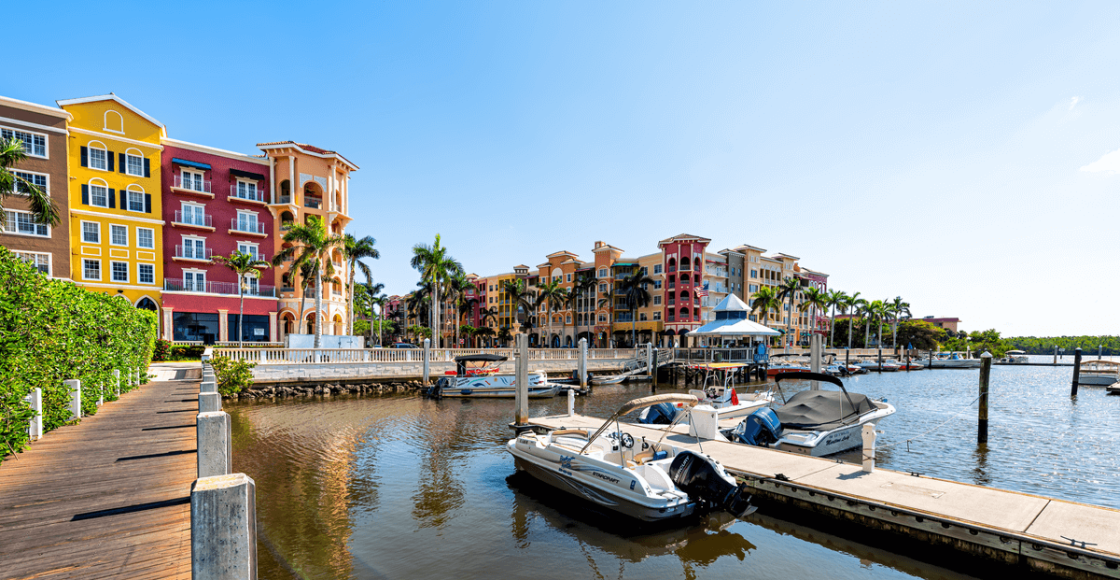
How Do I Start My Own Boat Charter Business?

Table of Contents
Last Updated on May 19, 2022 by Boatsetter Team
Have you ever thought about starting a charter business ? As a boat owner, you might have found that the costs of owning a boat can add up quickly. You might not have quite as much time as you used to for boating now, so it might seem that your boat goes unused for much of the year. Likewise, there’s been a lot of talk in the last year about the “Great Resignation”—people quitting their jobs out of a desire for something better. Fascinatingly, many Americans have turned to entrepreneurship.
For many, starting their own business has meant joining the rapidly growing sharing economy (think the Airbnb, Uber, and Turo’s of the world). Believe it or not, you can do the same thing by listing your vessel as a boat charter, or even just as a basic boat rental. So, how do you get started? Easy—you can start your own boat, yacht or fishing charter business right here on Boatsetter .
Before we dive in, let’s take a closer look at the various types of charters you may be interested in running, and some tips for success as you get started.
How to Start a Boat Charter Business
- Determine the type of charter you’re interested in running—bareboat boat, captained, fishing, or luxury yacht charters.
- Use a peer-to-peer boat rental platform to list your boat(s) or fleet.
- Easy secure peer-to-peer or commercial boat insurance , for peace-of-mind to protect yourself and your boats from potential damages and liability.
- Create a listing for your boat(s) or charter(s), including price, location, images, description, and other relevant details.
- Manage your charter business (bookings, schedule, payment, reviews) directly on the peer-to-peer rental platform.
Get Started Now: Sign Up to List Your Boat or Charter for Free

Types of Boat Charters
Firstly, boat charter is another way of saying “boat rental.” As the owner, you make your vessel available for other cruisers to book. They can do so for as little as a few hours. Additionally, you’re typically providing just the boat. Therefore, the cruisers are responsible for navigation and provisioning—although there are exceptions.
For instance, with some charter boat businesses, boat owners provide a customized itinerary and necessary provisions. They may provide a professional captain, too—these are called captained charters . This is especially helpful if the interested parties are unfamiliar with the waters. It’s also important for novice boaters. In fact, it’s common for newcomers to use boat and yacht charter as a way to “try before you buy.”
Two types of charter boat businesses that definitely include captains and custom itineraries are fishing charters and luxury yacht charters.
- Fishing charters are exactly what they sound like: a few hours on the water pursuing different fish, with an expert guide. The boat owner supplies the fishing gear, along with safety equipment, of course, and niceties like bottled water.
- Luxury yacht charters , meanwhile, offer more white-glove service. They’re typically up to a week in a highly desirable location, ranging from the Bahamas to the Caribbean and to the Mediterranean. The yachts come with full professional crews, too, like a chef, stewardesses, and deckhands. All meals are included, with menus tailored to your tastes. The same is true for activities, like using watertoys.
Finally, bareboat charters are when cruisers rent or lease out a vessel for a certain period with time, with no crew or provisions provided.

Advice & Tips for Success for Starting Your Own Boat Charter Business
Use a peer-to-peer boat rental marketplace to list, manage, and advertise your fleet.
So, what exactly does starting a charter boat business entail? First, you should use a peer-to-peer rental platform, like Boatsetter !
Here’s how it works… Our team walk you through the process in getting started, and we’ll provide support each and every step of the way—from sign up, to listing your boat, connecting with potential renters, managing your boat’s schedule, and of course, getting paid!
Learn more about the process by visiting Why List with Boatsetter.
Understanding Insurance For a Boat Rental Business
Since your boat is a valuable asset, you need to be sure that it is safe if you decide to offer it as a charter rental. There are good reasons that you need good boat insurance , such as protecting yourself and your boat from expensive damage. Luckily, Boatsetter is the only peer-to-peer marketplace in the US that offers peer-to-peer boat insurance , thanks to our exclusive partnership with GEICO/BoatUS.
This Peer-to-Peer Boat Rental Policy is the primary policy that covers you during the Boatsetter rental period and it doesn’t require you to change anything that you already have with your regular boat policy. Each Boatsetter rental covered under this policy comes with significant liability coverage, and is ideal for owners who are interested in chartering because the insurance costs are very low.
Create Your Detailed Listing to Ensure You Stand Out from the Rest
Once you have adequate insurance, you’ll still need to find people who want to rent your boat. Here are some really easy ways to make your boat more attractive as a charter rental when listing on Boatsetter (take a quick look at this list too).
Check Out Your Competition
Be sure to browse how owners of boats similar to yours list them. How do they describe the amenities? What types of photos do they include? What rates do they charge? Use these to determine the best way to show-and-tell your boat, as well as the experience cruisers can enjoy.
Include Great Images—and a Strong Description—and Keep Them Updated Regularly
In general, when listing your boat as a charter rental, keep your listing as current as possible by updating your images constantly.
Weigh your options for how and when to offer your boat for charter. Do you want to provide a few hours on weekdays during spring, summer, and fall in your home waters? Are you open to both weekdays and weekends during peak season? Or, do you chase the sun and therefore want to offer charters in different states at different times of the year?
Always Provide Good Customer Service
Always respond as quickly as you can to queries about your charter rental. Make sure you obtain reviews from previous satisfied customers. Finally, make sure your price is competitive and comparable to the cost of other similar charter rentals.
If you follow those suggestions, it should be easy to list your boat as a charter rental. Once you’ve signed up your boat on Boatsetter and successfully listed it as a charter rental a few times, you might want to invest in a few more boats. Luckily, listing your boat on Boatsetter is a seamless process. Our expert team is available to walk you through any questions you might have.
The Boatsetter Difference
Since you’re already here at Boatsetter , you may know that its peer-to-peer rental platform makes starting a boat charter business pretty simple. In fact, Boatsetter’s co-founder, Jaclyn Baumgarten, created the company because she believed that boats should be as accessible as Airbnb rental properties. Simultaneously, she believed that boat owners should be able to earn money to offset upkeep costs.
While Boatsetter lets you respond to booking requests and messages, it makes your listings—and time—more workable in other ways. Boat managers are at your disposal to handle these tasks, plus update your calendar and edit listings.
Of primary importance, though, Boatsetter is the only insured peer-to-peer boat rental platform in the United States. GEICO Marine Insurance Company underwrites coverage, created from scratch as a standalone policy covering the period of time the boat is under rental. And, for even more safety and peace of mind, on-the-water assistance comes via TowBoatUS.
All that’s left to do now is to list and lease—and love how you can earn.
List Your Boat on Boatsetter Today
Editor’s Note: This article was originally published in Sept. 2020 and updated in Feb. 2022.

Boatsetter empowers people to explore with confidence by showing them a world of possibility on the water. Rent a boat, list your boat, or become a Boatsetter captain today.
Browse by experience

Explore articles

How Much to Tip a Fishing Guide: Learn the proper tipping etiquette

Boat Hulls 101: Complete Guide to Boat Hull Types, Shapes, and Designs

Everything You Need to Know About Sandbar Parties

Boatsetter Helps Instacart Make Its Arrival To Miami In Style
- Inquire Now
- YACHT SEARCH
- Motor Yachts
- Sailing Yachts
- $1 – $25,000 Yachts
- $26,000 – $50,000 Yachts
- $50,000 – $100,000 Yachts
- $101,000 – $200,000 Yachts
- $200,000 – ∞ Yachts
- Virgin Islands
- Leeward Islands
- Turks and Caicos
- Spain & Balearic Islands
- New England
- Tahiti & South Pacific
- More destinations
- Charter Advice
Is Owning a Yacht for Charter Profitable
Is owning a yacht for charter profitable.
Yes, owning a yacht for charter can be profitable but owning a yacht will rarely “pay for itself.” Chartering your yacht presents some unique benefits that can lead to opportunities to make a profit off of your investment in a myriad of ways, including offsetting the cost of owning a yacht , selling your yacht for a profit, and even making a profit (if you’re among the lucky few who have the know-how and the right vessel).
Welcome to the yachting lifestyle.

Offsetting the Costs of Owning a Yacht
Chartering out your personal yacht to offset ownership costs..
One of the greatest benefits of chartering your yacht is making some money from your investment when you’re not using it. It’s a simple way to offset the cost of something that would otherwise sit and cost money. It also gives you more to work with as far as keeping the yacht up to date.
Keep in mind, the service and maintenance of a yacht is expensive but also a primary factor in whether or not your yacht will continue to retain value or even exceed value. Since routine refittings and redesigns are often unavoidable and cost up to 10 percent of your yacht’s value each year, this option offers you the added benefit of maximizing profits as well as your enjoyment each time you decide to set sail on another vacation.
Yacht charter management is a strategy to not only maintain your yacht, but also pay less in the long run when it comes to costs of docking, maintenance, insurance, and other operating expenses for your yacht.
Selling Your Yacht for Profit
Gaining a positive reputation among a network of yacht enthusiasts..
Net profits from a yacht charter are a faraway dream for most, but not impossible for some. Having a company to manage your charter within a flourishing network of yachters will help maximize your return on investment. There are some makes, models, and routes that are much more popular, and it pays to know where to best place your investment from the start, as unlike the trend with most types of cars or boats, not all yachts immediately begin depreciating in value.
Opening your vessel up to a network of yacht enthusiasts also increases the likelihood that your yacht will gain a positive reputation, thus more value among buyers or anyone interested in a yacht charter, making it much more desirable for both charter guests and purchases—that is, if it is a well-managed operation. It’s much more likely a prospect looking to buy your yacht will take it for a spin before purchasing.
Built-for-Profit Vessel
Some yachts are specifically designed to make money..
Having a yacht that is custom-built for charters or, put simply, turning profits, is the best way to go about using a yacht charter solely for investment purposes. It’s not impossible to make money with a yacht charter, but it also takes a good amount of experience and skill to get the job done right.
There are so many dynamic factors that are involved with running a successful yacht for charter operation, and one of the main things to keep in mind is the quality of service you’re providing your customers. This will be a factor in determining how much your vessel is worth to your yacht charter guests.
Owning a yacht for charter is profitable in more ways than one, but getting all the moving parts right requires some know-how and expertise with yacht charters. Remember, you can offset the cost of owning your yacht, sell your yacht for a profit, or design a yacht for money-making purposes—the dream is possible with help from experts.
Be it profit or pleasure, a yacht yields a lifetime of happiness.
Go to Knowledgebase
Destinations
- Amalfi Boat Charter
- Galapagos Luxury Boat
- Thailand Boat
- Cruising The Ionian Islands
- Yacht Rental Maine
- Juneau Yacht Charters
- Yacht in Bora Bora
- Sail Juneau
- Yacht Charter Hvar
Yachts & Yacht Builders
- Beneteau Sailing Yachts
- Hatteras Yachts
- Sunreef Sailing Catamaran
- Mangusta Yacht
- Elysian Yacht Charter
- Ferretti Yachts
- Endless Summer Yacht
- Benetti Yachts
- Fountaine Pajot Catamaran
- Sherakhan Yacht
Luxury Charters
- Luxury Yacht Vacation
- Yacht Charter Santorini
- Sailing Norway
- Miami Fl to Bahamas By Boat
- Tortola Boat Charters
- Corsica Yacht Charter
- Catamaran Charter Corfu
- Yacht Charter Cannes
Set your search criteria to find the perfect yacht
- Alaska Australia Bahamas BVI Caribbean Croatia Florida France Galapagos Greece Indonesia Italy Malaysia Maldives Mexico Mediterranean New England Norway Spain Thailand Tahiti Turkey
- Motor Yacht Catamaran Sailing Boats
- 2 4 6 8 10 12 12+
Search by yacht name
We earn commissions if you shop through the links below. Read more
Charter Boat Business
Back to All Business Ideas
Navigating the Waters of a Charter Boat Business Startup
Written by: Carolyn Young
Carolyn Young is a business writer who focuses on entrepreneurial concepts and the business formation. She has over 25 years of experience in business roles, and has authored several entrepreneurship textbooks.
Edited by: David Lepeska
David has been writing and learning about business, finance and globalization for a quarter-century, starting with a small New York consulting firm in the 1990s.
Published on March 26, 2022 Updated on July 2, 2024
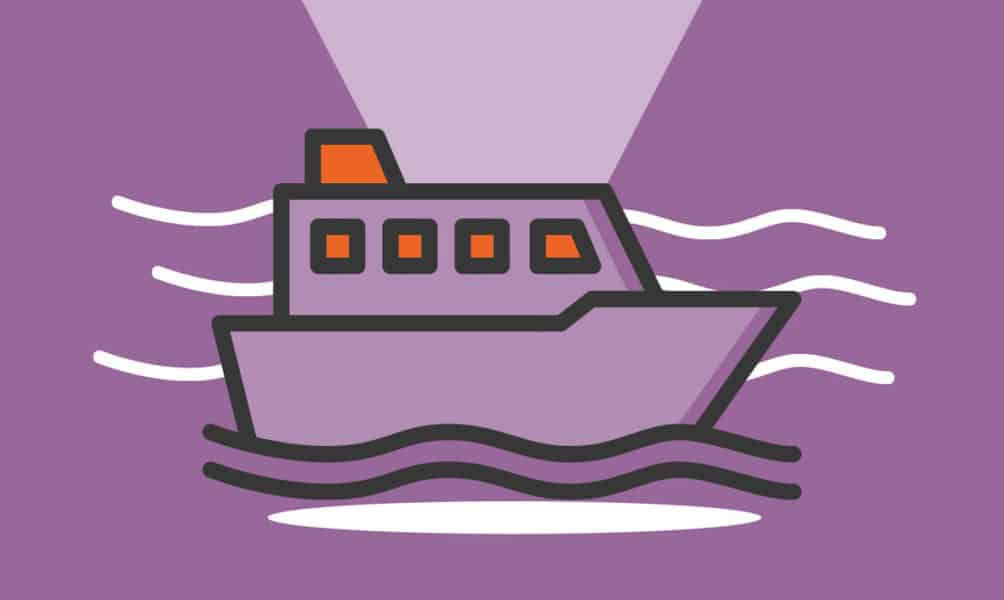
Investment range
$5,550 - $12,100
Revenue potential
$84,000 - $210,000 p.a.
Time to build
1 – 3 months
Profit potential
$60,000 - $150,000 p.a.
Industry trend
Here are the most important things to know when you are starting your charter boat business:
- Location — Choose a location that’s close to the ocean, sea, lake, or river. Also, make sure the conditions of these water bodies match the offers you are listing such as fishing, sightseeing, or watersports.
- Buy boats — Your charter business will need different types of boats. Decide if you want to invest in new or used boats, and consider different financing options, such as loans and leases tailored to maritime assets . You can usually find the best deals from boat dealers, boat shows, private sellers, and auctions.
- Licenses and certificates — In many places, operating a charter boat requires a boating license or a more specialized captain’s license such as a USCG Captain’s License . If your charter operates in navigable waters, it might need to be inspected and certified by the Coast Guard or equivalent authority. If your charter involves fishing, you may need a license to fish in those waters, and your customers might also need to obtain fishing licenses.
- Niche — Stand out with specialized offers such as fishing charters, eco-tours, luxury cruises, adventure sports, event hosting, or cultural tours.
- Register your business — A limited liability company (LLC) is the best legal structure for new businesses because it is fast and simple. Form your business immediately using ZenBusiness LLC formation service or hire one of the best LLC services on the market.
- Insurance — Make sure you have liability insurance, hull insurance, and other policies to protect your business.
- Legal business aspects — Register for taxes, open a business bank account, and get an EIN .
- Maintenance — Set up a routine maintenance schedule, perform regular inspections, and use software to track all maintenance activities and repairs.
Interactive Checklist at your fingertips—begin your charter boat business today!
You May Also Wonder:
How profitable can a charter boat business be?
With prices at $700 per party per day, you can make excellent money. As long as you’re in a good location and you’re knowledgeable about the area, you can be successful.
How can I start a charter boat business with no experience?
You can take various online courses to learn about boating through the Boat U.S. Foundation . Courses cost between $35 and $40. Hands on boating education requirements and providers for licensing purposes vary by state.
Is it hard to start a charter boat business?
Like any business, starting a charter boat business is challenging. You should do plenty of research before deciding if it’s right for you.
What is the salary of a charter captain?
Charter boat captain salaries vary by location. Salaries usually fall somewhere in the $60,000s.
What is the largest boat charter company?
Dream Yacht Charter is the largest charter boat company. They have nearly 1,000 boats in their fleet.
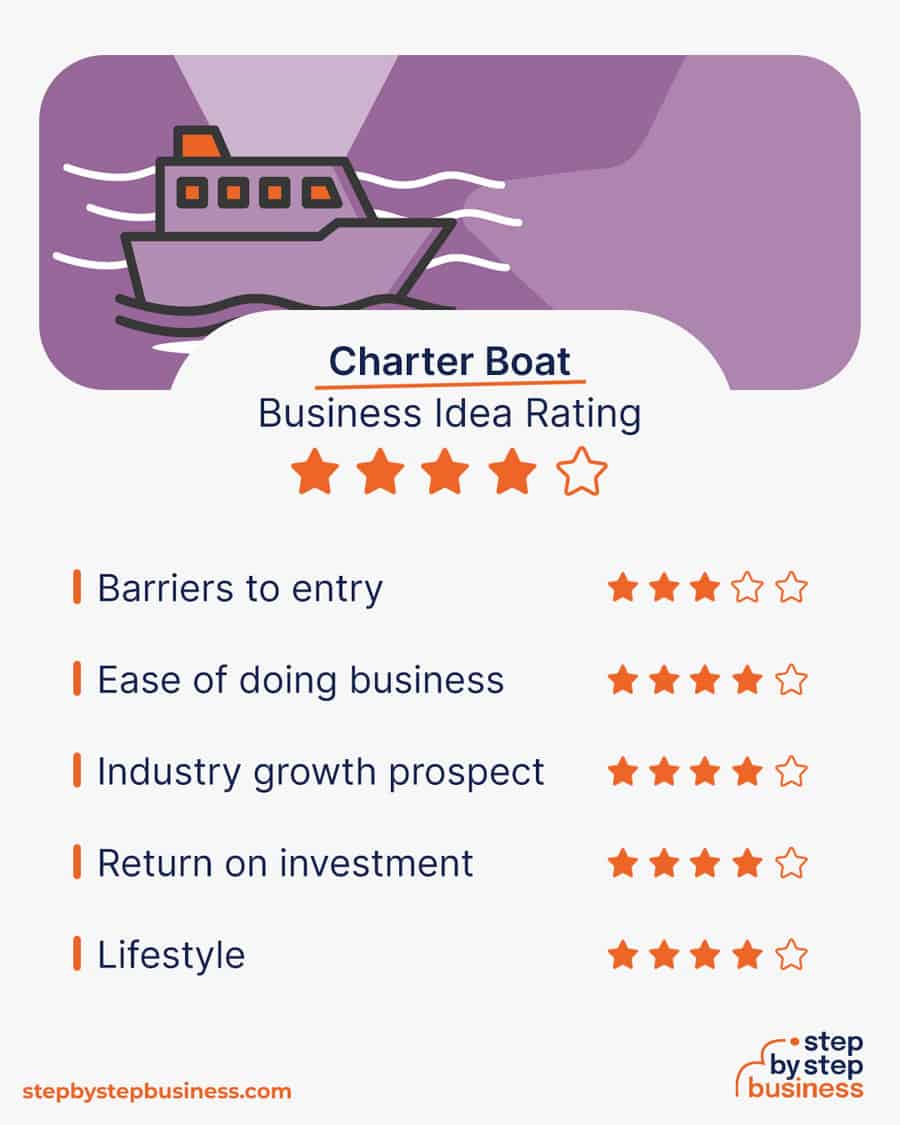
Step 1: Decide if the Business Is Right for You
Pros and cons.
Starting a charter boat business has pros and cons to consider before deciding if it’s right for you.
- Good money — Make $700 per day in-season
- Fun! — Be in the sun on the water all day
- Flexibility — Choose when to schedule trips
- Weather-dependent — Cancelled trips due to extreme weather
- High startup costs — Boats are expensive
Charter Boat Industry Trends
Industry size and growth.
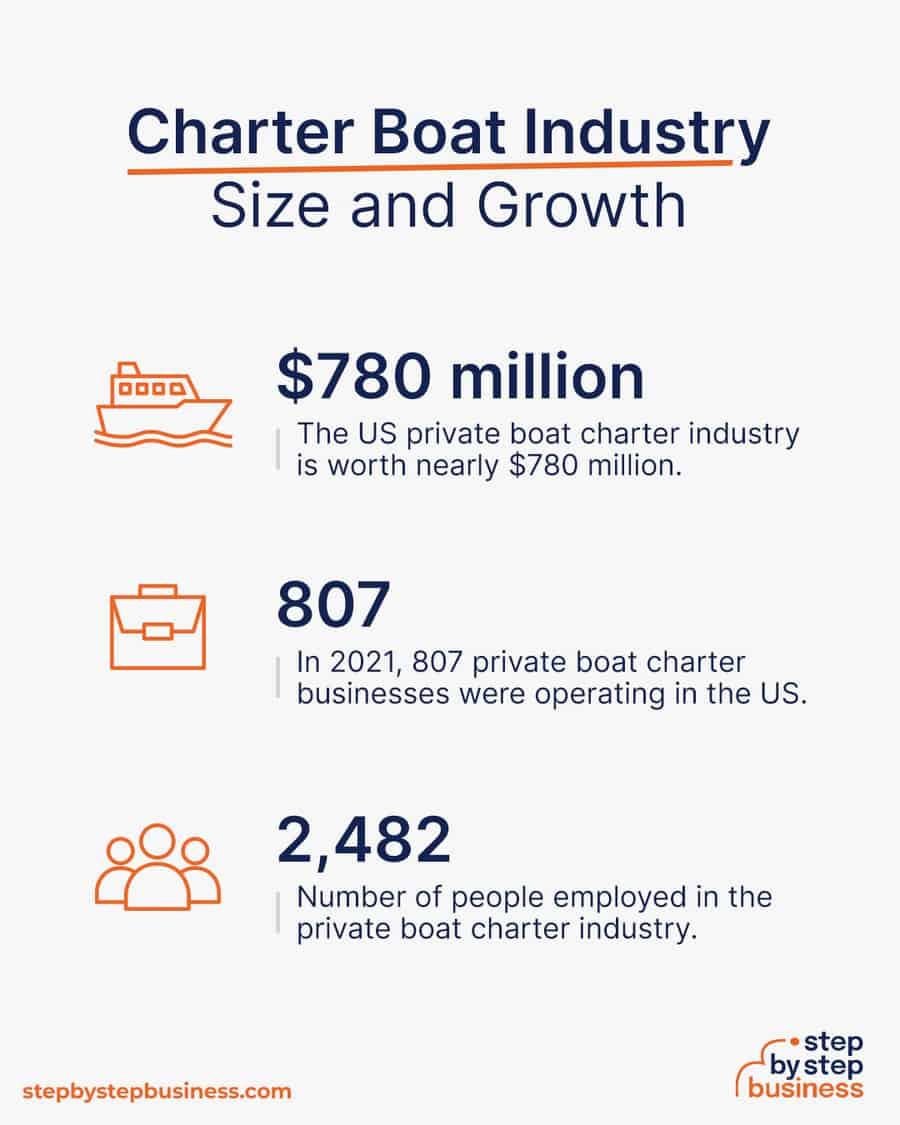
- Industry size and past growth — The US private boat charter industry is worth nearly $877 million after an average annual growth of 2.4% in the last five years.
- Growth forecast — The US private boat charter industry is expected to steadily keep growing over the next five years.
- Number of businesses — There are about 800 private boat charter businesses operating in the US.
- Number of people employed — The private boat charter industry employs about 2,500 people.(( https://www.ibisworld.com/united-states/market-research-reports/private-boat-charters-industry/ ))
Trends and Challenges
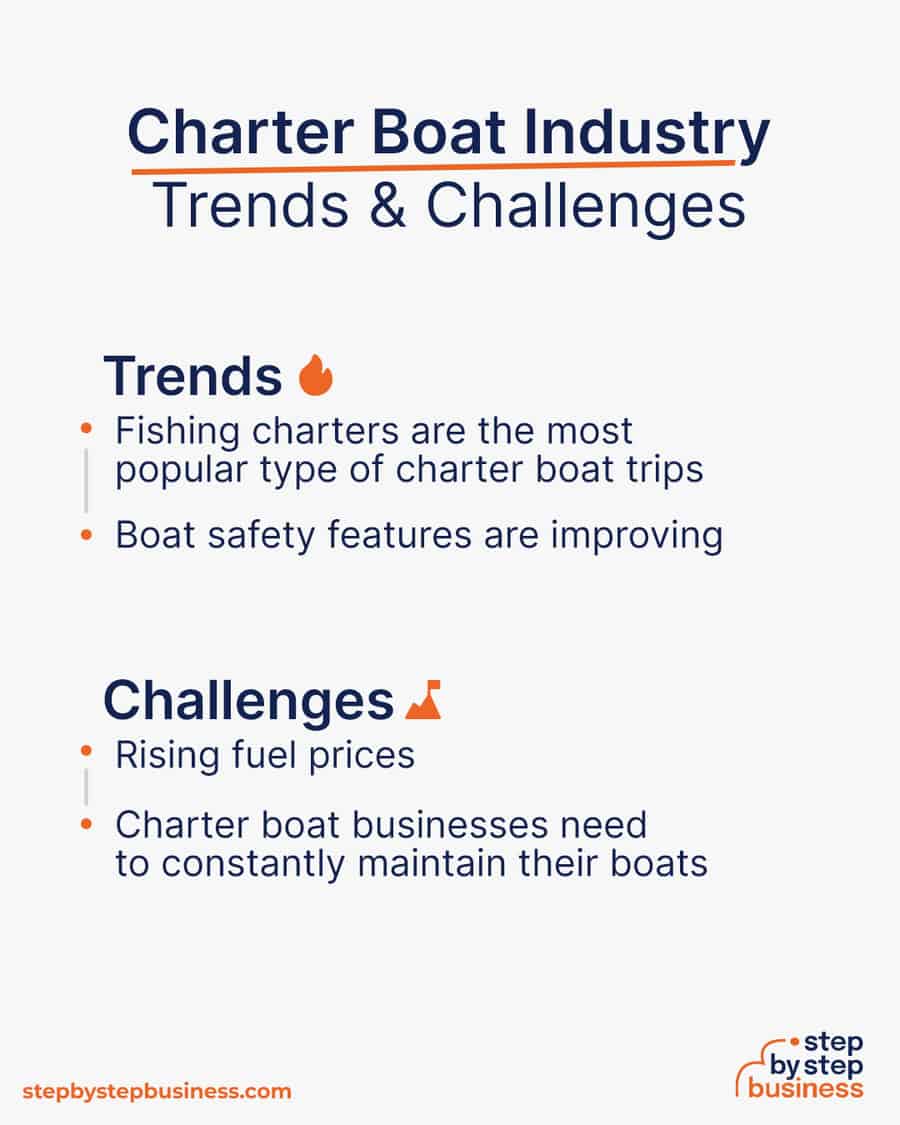
- Fishing charters are the most popular type of charter boat trips, presenting an opportunity for charter boat businesses to specialize.
- Boat safety features are improving, so a charter boat business that has all the latest safety features can have a competitive edge.
- Rising fuel prices are cutting into the profit margins of charter boat businesses.
- Charter boat businesses need to constantly maintain their boats, a cost that is often underestimated.
How Much Does It Cost to Start a Charter Boat Business?
The startup costs for a charter boat business range from $5,500 to $12,000. The largest expense is for a down payment on a boat.
You’ll need a handful of items to successfully launch your charter boat business, including:
- Life jackets
- Fire extinguishers and other safety equipment
- Fishing equipment
| Start-up Costs | Ballpark Range | Average |
|---|---|---|
| Setting up a business name and corporation | $150–$200 | $175 |
| Business licenses and permits | $100–$300 | $200 |
| Insurance | $100–$300 | $200 |
| Business cards and brochures | $200–$300 | $250 |
| Boat down payment | $3,000–$7,000 | $5,000 |
| Life jackets, fishing equipment, other equipment | $2,000–$4,000 | $3,000 |
| Total | $5,550–$12,100 | $8,825 |
How Much Can You Earn From a Charter Boat Business?
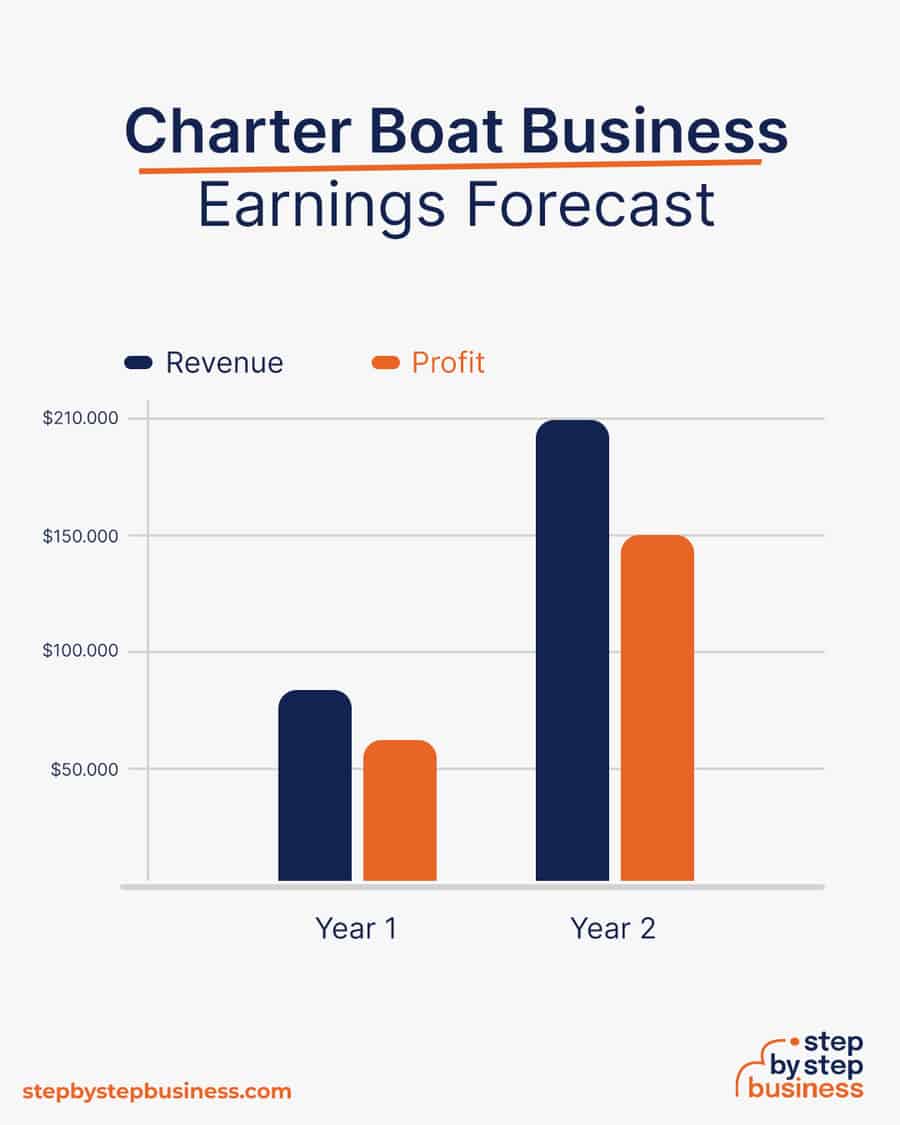
The average price for a one-day boat rental or charter is $700. Your profit margin after fuel and maintenance should be about 70%.
In your first year or two, you could do 120 one-day rentals per season, bringing in $84,000 in annual revenue. This would mean nearly $60,000 in profit, assuming a 70% margin. As your business gains traction, sales could climb to 300 trips in a year. With an annual revenue of $210,000, you’d make a tidy profit of close to $150,000.
What Barriers to Entry Are There?
There are a few barriers to entry for a charter boat business. Your biggest challenges will be:
- The cost of a down payment on a boat
- The boating skills required to be a charter boat captain
Related Business Ideas
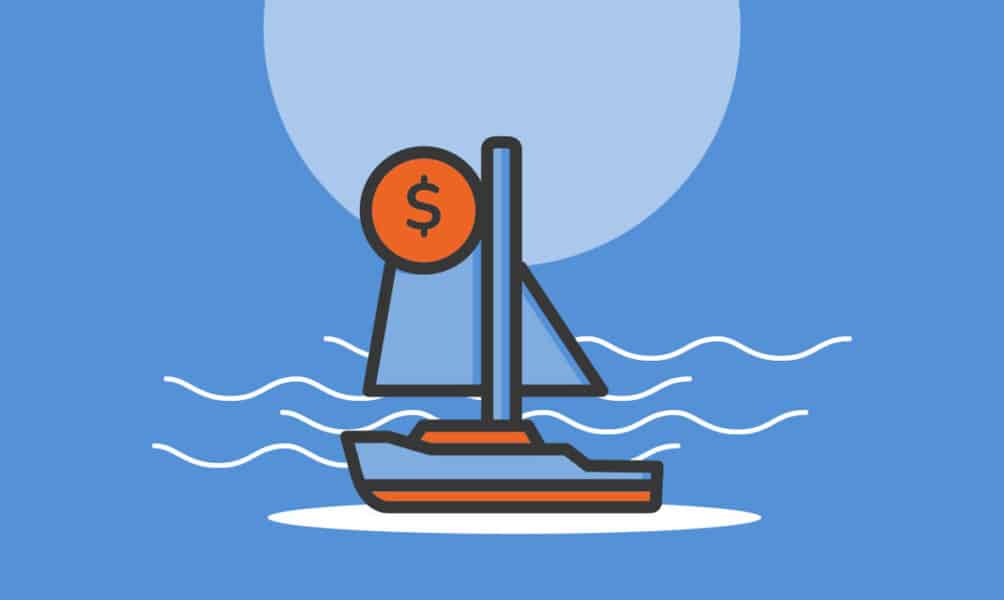
How to Start a Profitable Boat Rental Business

How to Start Your Own Freight Forwarding Business

How to Start a Box Truck Business in 13 Steps
Step 2: hone your idea.
Now that you know what’s involved in starting a charter boat business, it’s a good idea to hone your concept in preparation to enter a competitive market.
Choose a Location for a Charter Boat Business
When selecting a location for your charter boat business, it’s essential to weigh various factors:
- Market demand — Research the local and tourist demand for charter boat services in potential locations. Look for areas with a high influx of tourists, especially those interested in activities like fishing, sightseeing, or water sports.
- Access to water bodies — The proximity to and accessibility of suitable water bodies (oceans, lakes, rivers) is crucial. Consider the types of activities your charter will offer and choose a location that supports these activities (e.g., deep-sea fishing requires access to the ocean).
- Marina facilities — Evaluate the quality of marina facilities. Good mooring spots, maintenance services, fueling stations, and customer amenities are essential for the smooth operation of your business.
- Weather and seasonality — Consider the climate and weather patterns. Areas with longer seasons of good weather can potentially offer more business days. However, also prepare for off-season business strategies.
- Customer accessibility — Look at how easy it is for customers to reach your location. Proximity to tourist hotspots, hotels, and transport hubs can be advantageous.
- Economic stability — The economic stability of the location can impact your business. Thriving economic areas with higher disposable incomes can be more lucrative.
- Local partnerships and networking — Explore potential partnerships with local businesses such as hotels, travel agencies, and event planners. These partnerships can provide a steady stream of customers.
- Scenic appeal and unique offerings — Areas with natural beauty or unique marine life can attract more customers. Consider what unique features your location can offer that others can’t.
- Safety and security — Ensure the location is safe for customers and your business. This includes both on-water safety and the general safety of the area.
Why? Identify an Opportunity
Research charter boat businesses in your area to examine their services, price points, and customer reviews. You’re looking for a market gap to fill. For instance, maybe the market is missing a charter boat business that offers dinner cruises or snorkeling and diving. A location with fewer existing charter services might offer more opportunities but consider if the low competition is due to poor demand.
You might consider targeting a niche market by specializing in a certain aspect of your industry, such as fishing or late night party cruises.
Your services will depend on the type of charters you decide to offer. Those can be fishing charters , diving charters, late-night cruises, local boat tours, and more. You can also offer food and drinks.
Read our interview with the founders of Catamaran Guru to gain invaluable insights on building a successful yacht sales and charter management business.
How Much Should You Charge for Charter Boats?
The average price for a day charter is $700. You should check prices in your area to make sure that you’re competitive. You should aim for a profit margin of about 70%. Once you know your costs, you can use our profit margin calculator to determine your markup and final price points. Remember that the prices you use at launch should be subject to change if warranted by the market.
Who? Identify Your Target Market
Your target market will be broad, mainly tourists. You should spread out your marketing to include sites like TikTok, Instagram, and Facebook.
Step 3: Brainstorm a Charter Boat Business Name
Here are some ideas for brainstorming your business name:
- Short, unique, and catchy names tend to stand out
- Names that are easy to say and spell tend to do better
- Name should be relevant to your product or service offerings
- Ask around — family, friends, colleagues, social media — for suggestions
- Including keywords, such as “charter boating” or “charter fishing,” boosts SEO
- Name should allow for expansion, for example, “High Seas Charter Services” over “Scuba Diving Charters”
- A location-based name can help establish a strong connection with your local community and help with the SEO, but might hinder future expansion
Discover over 310 unique charter boat business name ideas here . If you want your business name to include specific keywords, you can also use our charter boat business name generator. Just type in a few keywords, hit Generate, and you’ll have dozens of suggestions at your fingertips.
Once you’ve got a list of potential names, visit the US Patent and Trademark Office website to make sure they are available for registration and check the availability of related domain names using our Domain Name Search tool. Using “.com” or “.org” sharply increases credibility, so it’s best to focus on these.
Find a Domain
Powered by GoDaddy.com
Finally, make your choice among the names that pass this screening and go ahead with domain registration and social media account creation. Your business name is one of the key differentiators that sets your business apart. Once you pick your company name and start with the branding, it is hard to change the business name. Therefore, it’s important to carefully consider your choice before you start a business entity.
Step 4: Create a Charter Boat Business Plan
Here are the key components of a business plan:

- Executive summary — A brief overview highlighting the key points of the charter boat business plan, summarizing its objectives and potential
- Business overview — Detailed information about the charter boat business, including its mission, vision, and the problem it aims to solve in the market
- Product and services — Clearly defined offerings, specifying the types of charter boat services, packages, and any additional amenities provided
- Market analysis — An examination of the target market, identifying customer needs, market trends, and potential growth opportunities for the charter boat business
- Competitive analysis — Evaluation of competitors in the charter boat industry, highlighting strengths and weaknesses to position the business effectively in the market
- Sales and marketing — Strategies for promoting and selling charter boat services, including pricing, advertising, and promotional activities to attract customers
- Management team — Introduction of the key individuals responsible for running the charter boat business, emphasizing their expertise and roles
- Operations plan — Details on how the business will operate, covering logistics, maintenance, safety protocols, and any partnerships necessary for smooth operations
- Financial plan — Projections of the charter boat business’s financial performance, including revenue forecasts, expense estimates, and break-even analysis
- Appendix — Supplementary materials, such as charts, graphs, or additional documentation, supporting, and enhancing the information presented in the charter boat business plan
If you’ve never created a business plan, it can be an intimidating task. You might consider hiring a business plan specialist to create a top-notch business plan for you.
Step 5: Register Your Business
Registering your business is an absolutely crucial step — it’s the prerequisite to paying taxes, raising capital, opening a bank account, and other guideposts on the road to getting a business up and running.
Plus, registration is exciting because it makes the entire process official. Once it’s complete, you’ll have your own business!
Choose Where to Register Your Company
Your business location is important because it can affect taxes, legal requirements, and revenue. Most people will register their business in the state where they live, but if you’re planning to expand, you might consider looking elsewhere, as some states could offer real advantages when it comes to charter boat businesses.
If you’re willing to move, you could really maximize your business! Keep in mind that it’s relatively easy to transfer your business to another state.
Choose Your Business Structure
Business entities come in several varieties, each with its pros and cons. The legal structure you choose for your charter boat business will shape your taxes, personal liability, and business registration requirements, so choose wisely.
Here are the main options:

- Sole proprietorship — The most common structure for small businesses makes no legal distinction between company and owner. All income goes to the owner, who’s also liable for any debts, losses, or liabilities incurred by the business. The owner pays taxes on business income on his or her personal tax return.
- General partnership — Similar to a sole proprietorship, but for two or more people. Again, owners keep the profits and are liable for losses. The partners pay taxes on their share of business income on their personal tax returns.
- Limited Liability Company (LLC) — Combines the characteristics of corporations with those of sole proprietorships or partnerships. Again, the owners are not personally liable for debts.
- C Corporation — Under this structure, the business is a distinct legal entity, and the owner or owners are not personally liable for its debts. Owners take profits through shareholder dividends rather than directly. The corporation pays taxes, and owners pay taxes on their dividends, which is sometimes referred to as double taxation.
- S Corporation — This refers to the tax classification of the business but is not a business entity. Either a corporation or an LLC can elect to be an S Corp for tax status. Here, income is passed through directly to shareholders, who pay taxes on their share of business income on their personal tax returns.
We recommend that new business owners choose LLC as it offers liability protection and pass-through taxation while being simpler to form than a corporation. You can form an LLC in as little as five minutes using an online LLC formation service. They will check that your business name is available before filing, submit your articles of organization , and answer any questions you might have.
Form Your LLC
Choose Your State
We recommend ZenBusiness as the Best LLC Service for 2024

Step 6: Register for Taxes
The final step before you’re able to pay taxes is getting an Employer Identification Number or EIN. You can file for your EIN online or by mail/fax. Visit the IRS website to learn more. Keep in mind that, if you’ve chosen to be a sole proprietorship, you can simply use your social security number as your EIN.
Once you have your EIN, you’ll need to choose your tax year. Financially speaking, your business will operate in a calendar year (January–December) or a fiscal year, a 12-month period that can start in any month. This will determine your tax cycle, while your business structure will determine which taxes you’ll pay.
The IRS website also offers a tax-payers checklist , and taxes can be filed online.
It is important to consult an accountant or other professional to help you with taxes to ensure you’re completing them correctly.
Step 7: Fund Your Business
Securing financing is your next step, and there are plenty of ways to raise capital:

- Bank loans — This is the most common method, but getting approved requires a rock-solid business plan and a strong credit history.
- SBA-guaranteed loans — The Small Business Administration can act as a guarantor, helping gain that elusive bank approval via an SBA-guaranteed loan .
- Government grants — A handful of financial assistance programs help fund entrepreneurs. Visit Grants.gov to learn which might work for you.
- Friends and family — Reach out to friends and family to provide a business loan or investment in your concept. It’s a good idea to have legal advice when doing so because SEC regulations apply.
- Crowdfunding — Websites like Kickstarter and Indiegogo offer increasingly popular low-risk options in which donors fund your vision. Entrepreneurial crowdfunding sites like Fundable and WeFunder enable multiple investors to fund your business.
- Personal — Self-fund your business via your savings or the sale of property or other assets.
Bank and SBA loans are probably the best options, other than friends and family, for funding a charter boat business. You might also try crowdfunding if you have an innovative concept.
Step 8: Apply for Licenses and Permits
Starting a charter boat business requires obtaining a number of licenses and permits from local, state, and federal governments.
The US Coast Guard requires boat owners who run a charter to have a captain’s license. You can find information on getting this license with Maritime Professional Training . You may also need a fishing guide license.
Federal regulations, licenses, and permits associated with starting your business include doing business as (DBA), health licenses and permits from the Occupational Safety and Health Administration ( OSHA ), trademarks, copyrights, patents, and other intellectual properties, as well as industry-specific licenses and permits.
You may also need state-level and local county or city-based licenses and permits. This includes licenses, safety regulations, fishing limits, and environmental guidelines. The license requirements and how to obtain them vary, so check the websites of your state, city, and county governments or contact the appropriate person to learn more.
You could also check this SBA guide for your state’s requirements, but we recommend using MyCorporation’s Business License Compliance Package . They will research the exact forms you need for your business and state and provide them to ensure you’re fully compliant.
This is not a step to be taken lightly, as failing to comply with legal requirements can result in hefty penalties.
If you feel overwhelmed by this step or don’t know how to begin, it might be a good idea to hire a professional to help you check all the legal boxes.
Step 9: Open a Business Bank Account
Before you start making money, you’ll need a place to keep it, and that requires opening a bank account .
Keeping your business finances separate from your personal account makes it easy to file taxes and track your company’s income, so it’s worth doing even if you’re running your charter boat business as a sole proprietorship. Opening a business bank account is quite simple and similar to opening a personal one. Most major banks offer accounts tailored for businesses — just inquire at your preferred bank to learn about their rates and features.
Banks vary in terms of offerings, so it’s a good idea to examine your options and select the best plan for you. Once you choose your bank, bring in your EIN (or Social Security Number if you decide on a sole proprietorship), articles of incorporation, and other legal documents and open your new account.
Step 10: Get Business Insurance
Business insurance is an area that often gets overlooked, yet it can be vital to your success as an entrepreneur. Insurance protects you from unexpected events that can have a devastating impact on your business.
Here are some types of insurance to consider:

- General liability — The most comprehensive type of insurance, acting as a catch-all for many business elements that require coverage. If you get just one kind of insurance, this is it. It even protects against bodily injury and property damage.
- Business property — Provides coverage for your equipment and supplies.
- Equipment breakdown insurance — Covers the cost of replacing or repairing equipment that has broken due to mechanical issues.
- Worker’s compensation — Provides compensation to employees injured on the job.
- Property — Covers your physical space, whether it is a cart, storefront, or office.
- Commercial auto — Protection for your company-owned vehicle.
- Professional liability — Protects against claims from a client who says they suffered a loss due to an error or omission in your work.
- Business owner’s policy (BOP) — This is an insurance plan that acts as an all-in-one insurance policy, a combination of the above insurance types.
Step 11: Prepare to Launch
As opening day nears, prepare for launch by reviewing and improving some key elements of your business.
Essential Software and Tools
Being an entrepreneur often means wearing many hats, from marketing to sales to accounting, which can be overwhelming. Fortunately, many websites and digital tools are available to help simplify many business tasks.
You may want to use industry-specific software, such as Sedna , Starboard Suite , or Stellar , to manage your bookings, scheduling, invoicing, and payments.
- Popular web-based accounting programs for smaller businesses include Quickbooks , FreshBooks , and Xero .
- If you’re unfamiliar with basic accounting, you may want to hire a professional, especially as you begin. The consequences of filing incorrect tax documents can be harsh, so accuracy is crucial.
Develop Your Website
Website development is crucial because your site is your online presence and needs to convince prospective clients of your expertise and professionalism.
You can create your own website using website builders . This route is very affordable, but figuring out how to build a website can be time-consuming. If you lack tech savvy, you can hire a web designer or developer to create a custom website for your business.
However, people are unlikely to find your website unless you follow Search Engine Optimization ( SEO ) practices. These are steps that help pages rank higher in the results of top search engines like Google.
Here are some powerful marketing strategies for your future business:
- Local SEO — Optimize your website to showcase your charter services, boats, and unique experiences, improving visibility in search results for charter-related terms. Regularly update your Google My Business and Yelp profiles to strengthen your local search presence.
- Professional branding — Ensure your branding captures the essence of adventure, luxury, or relaxation offered by your charters, reflected in everything from your logo to boat decor.
- Direct outreach — Partner with local hotels, travel agencies, and tourism boards to integrate your charters into travel packages and exclusive offers.
- Social media engagement — Use Instagram, Facebook, and YouTube to share captivating images and videos of your trips, highlighting customer experiences and the beauty of the destinations.
- Sea adventures blog — Publish posts about local marine life, fishing tips, and scenic routes to attract enthusiasts and inform potential customers.
- Video tours and guides — Create engaging video content that provides virtual tours of your vessels and insights into the charter experience.
- Open boat days — Organize events where prospective clients can tour your boats, meet the crew, and learn about the services offered.
- Local event participation — Showcase your services at waterfront festivals, boat shows, and fishing tournaments to connect with the community and attract customers.
- Business collaborations — Form referral partnerships with local businesses, like seaside restaurants or hotels, to offer enhanced packages.
- Loyalty rewards program — Develop a rewards program offering discounts or upgrades to frequent customers to foster loyalty and encourage repeat visits.
- Targeted digital advertising — Place ads on travel and tourism platforms and local online boards to specifically target individuals interested in charter services.
Focus on USPs

Unique selling propositions, or USPs, are the characteristics of a product or service that set it apart from the competition. Today’s customers are inundated with buying options, so you’ll have a real advantage if they can quickly grasp how your charter boat business meets their needs or wishes. It’s wise to do all you can to ensure your USPs stand out on your website and in your marketing and promotional materials, stimulating buyer desire.
Global pizza chain Domino’s is renowned for its USP: “Hot pizza in 30 minutes or less, guaranteed.” Signature USPs for your charter boat business could be:
- Fishing day trips to reel in the big one!
- Dinner cruises to view the sunset in style
- Tour the local scenery while relaxing on a luxury boat
You may not like to network or use personal connections for business gain, but your personal and professional networks likely offer considerable untapped business potential. Maybe that Facebook friend you met in college is now running a charter boat business, or a LinkedIn contact of yours is connected to dozens of potential clients. Maybe your cousin or neighbor has been working in boats for years and can offer invaluable insight and industry connections.
The possibilities are endless, so it’s a good idea to review your personal and professional networks and reach out to those with possible links to or interest in boating. You’ll probably generate new customers or find companies with which you could establish a partnership.
Step 12: Build Your Team
If you’re starting out small from a home office, you may not need any employees. But as your business grows, you will likely need workers to fill various roles. Potential positions for a charter boat business include:
- Charter boat drivers — driving on boat trips
- General manager — scheduling, accounting
- Marketing lead — SEO strategies, social media
At some point, you may need to hire all of these positions or simply a few, depending on the size and needs of your business. You might also hire multiple workers for a single role or a single worker for multiple roles, again depending on need. Free-of-charge methods to recruit employees include posting ads on popular platforms such as LinkedIn, Facebook, or Jobs.com. You might also consider a premium recruitment option, such as advertising on Indeed , Glassdoor , or ZipRecruiter . Further, if you have the resources, you could consider hiring a recruitment agency to help you find talent.
Step 13: Run a Charter Boat Business — Start Making Money!
What could be more fun than being the captain of your own ship and sharing the joy with your customers? You can make good money while spending your time in the sun on the water. You’ll need to make an investment to get started, but you’ll be stepping into an industry that’s growing fast. You’ve got the knowledge you need, so now it’s time to go ahead and launch your boat and your successful new business.
Leave a Reply Cancel reply
Your email address will not be published. Required fields are marked *
Save my name, email, and website in this browser for the next time I comment.
- Decide if the Business Is Right for You
- Hone Your Idea
- Brainstorm a Charter Boat Business Name
- Create a Charter Boat Business Plan
- Register Your Business
- Register for Taxes
- Fund Your Business
- Apply for Licenses and Permits
- Open a Business Bank Account
- Get Business Insurance
- Prepare to Launch
- Build Your Team
- Run a Charter Boat Business — Start Making Money!
Subscribe to Our Newsletter
Featured resources.

21 Profitable Beach Business Ideas for a Sunny Future
David Lepeska
Published on July 21, 2022
So you live near a beach. Lucky you! You can go swimming or walk barefoot in the sand any time you like. Even better, you could also start abusiness ...

41 Outdoor Business Ideas for an Active Lifestyle
Carolyn Young
Published on July 13, 2022
Many major American businesses depend on outdoor activities, such as The North Face or Columbia. But there are also countless smaller businessesthat ...

18 Leading Rental Business Ideas for Passive Income
Published on July 12, 2022
Businesses that rely on regular rental payments are guaranteed a steady stream of income, which is why so many of them draw so much entrepreneuriali ...
No thanks, I don't want to stay up to date on industry trends and news.
- EXPLORE Random Article
- Happiness Hub
How to Start a Yacht Charter Business
Last Updated: January 13, 2020 References
wikiHow is a “wiki,” similar to Wikipedia, which means that many of our articles are co-written by multiple authors. To create this article, volunteer authors worked to edit and improve it over time. This article has been viewed 50,958 times.
The business of chartering a yacht comes with many responsibilities. Not only do you have to establish a plan of action for servicing your clients, you also need to cover your assets. Review the following list of steps if you are interested in learning how to start a yacht charter business.

Expert Q&A
You might also like.

- ↑ https://www.profitableventure.com/yacht-charter-business-plan/
- ↑ https://bizfluent.com/how-7934974-start-boat-rental-business.html
- ↑ https://www.entrepreneur.com/businessideas/boat-charters
- ↑ https://www.startupbizhub.com/how-to-start-a-luxury-yacht-business.htm
- ↑ https://www.smallbusiness.wa.gov.au/business-advice/marketing/8-steps-to-marketing-your-business
- https://careertrend.com/how-6008791-start-sailing-business.html
About this article
Did this article help you.

- About wikiHow
- Terms of Use
- Privacy Policy
- Do Not Sell or Share My Info
- Not Selling Info
So You Want to Start a Yacht Charter Business!?!?
Combine your entrepreneurial spirit and a passion for yachting by starting a yacht chartering business.
- Starting A Yacht Charter Business
These are the lessons I learned when establishing Arkadaslik Yachting. You don't have to be rich, but you do need to be disciplined and thoughtful. And maybe a little bit crazy...
Starting a yacht charter business sounds appealing - spending your days on a luxury yacht, cruising to exotic locales, and hanging out with "the rich and famous". While there are many benefits to running your own business, especially when it coincides with your boating passion, in the end, it's still a job - and requires a lot of work. A. Lot. Of. Work!

Click to expand.

In addition to the basic principles which apply when establishing and running any business, there are issues impacting the world of boating which must also be factored in to your decisions.
Who's your customer, and what do they want?
There's an often misquoted movie saying - "build it and [they] will come". This is NOT true in the world of yacht chartering. Research your customer requirements first - and then get a boat that suits their needs.
If you want to appeal to companies for corporate meetings at sea, you'll need a high-end yacht with enough cabins to accommodate all guests (and their families) plus a large board-room type set-up. Corporate requirements will be vastly different from those of a family who want to spend the day celebrating Grandma's 90 th birthday, or a couple who want complete privacy for a romantic honeymoon get-away. This isn't an industry where people will take whatever yacht you have to offer. Your boat (or boats) must satisfy your customers' requirements (and budget) or they'll take their business elsewhere.
Different jurisdictions have different requirements for charter boats and charter businesses. Crossing borders can complicate matters. Make sure you know where your potential clientele want to travel, as that may also impact the specifications for your vessel.
What's your niche?
Make sure there's some uniquely defining characteristic or service that you can provide that will set you apart from your competition . There are thousands of yachts of every size and class available for charter around the world. And they all claim to be "the best". What characteristic will compel people to select your charter from all possible options?

What's your background?
If you're new to the industry (as I was when I established Arkadaslik Yachting ), develop a mentoring partnership with an established, trust-worthy business in the beginning. Take advantage of all they have to share - their expertise, network of contacts, customer base, etc. so you don't spend all your time "reinventing the wheel". Pro-actively expand your network of trusted business advisors to include areas such as hospitality, tourism, catering, agriculture and import/export trading. You'll be surprised at how often you need their advice.

Who will be working for you?
Hire qualified and experienced crew and treat them well. Your boat's crew will make or break the success of your venture. All hell can be breaking loose on the boat, but a good crew will deal with the issues in a professional manner, keeping your passengers safe and happy.
What's your budget?
Boats are virtual money pits and expenses aren't limited to the up-front cost. In addition to the initial purchase and all your "normal business" expenses, you have to factor in costs for routine maintenance, emergency maintenance, insurance (don't skimp on insurance), berthing fees, licensing, transit logs and harbour master formalities, crew salaries and insurance, laundry, uniforms, etc. And, you need a contingency fund because all of these need to be paid, whether you have bookings or not.
But, be aware that you don't need to spend a ton of money on marketing or advertising. Once you've got even a hint of a reputation, search for creative "out of the box" opportunities to expand your reach. I wrote a series of articles for the local newspaper to help potential customers understand the benefits of chartering a boat for their summer vacation. I invited influential travel bloggers to join us on trips when cabins would otherwise go empty. I hosted "open house" events while anchored in the harbour to entice our target demographic to come aboard and learn more about the services we offer. And I learned the value of social media as a free marketing tool!

Starting-up and running a yacht charter business is a rewarding way to earn a living. You need to be commited and resourceful, but with hard work and a bit of creativity, it is very possible to be successful. Best wishes if you choose to pursue the venture. Happy sailing!
| Available | Booked | Tentative | Not Available |
| M | T | W | Th | F | Sa | Su | |
|---|---|---|---|---|---|---|---|
| July 2024 | 1 | 2 | 3 | 4 | 5 | 6 | 7 |
| 8 | 12 | 13 | |||||
| 15 | |||||||
| 22 | 26 | 27 | 28 | ||||
| August 2024 | 29 | 30 | 31 | 1 | 2 | 3 | 4 |
| 5 | 6 | 7 | 8 | 9 | 10 | 11 | |
| 12 | 13 | 14 | 15 | 16 | 17 | 18 | |
| 19 | 20 | 21 | 22 | 23 | 24 | 25 | |
| 26 | 27 | 28 | 29 | 30 | 31 | 1 | |
| September 2024 | 2 | 3 | 4 | 5 | 6 | 7 | 8 |
| 9 | 10 | 11 | 12 | 13 | 14 | ||
| 16 | |||||||
| 23 | 24 | 25 | 26 | 27 | 28 | 29 | |
| October 2024 | 30 | 1 | 2 | 3 | 4 | 5 | |
| 7 | |||||||
| 14 | |||||||
| 21 | |||||||
| November 2024 | 28 | 29 | 30 | 31 | 1 | 2 | 3 |
| 4 | 5 | 6 | 7 | 8 | 9 | 10 | |
| 11 | 12 | 13 | 14 | 15 | 16 | 17 | |
| 18 | 19 | 20 | 21 | 22 | 23 | 24 | |
| 25 | 26 | 27 | 28 | 29 | 30 |
| M | T | W | Th | F | Sa | Su | |
|---|---|---|---|---|---|---|---|
| May 2025 | 28 | 29 | 30 | 1 | 2 | 3 | 4 |
| 5 | 6 | 7 | 8 | 9 | 10 | 11 | |
| 12 | 13 | 14 | 15 | 16 | 17 | 18 | |
| 19 | 20 | 21 | 22 | 23 | 24 | 25 | |
| 26 | 27 | 28 | 29 | 30 | 31 | 1 | |
| June 2025 | 2 | 3 | 4 | 5 | 6* | 7* | 8* |
| 9* | 10 | 11 | 12 | 13 | 14 | 15 | |
| 16 | 17 | 18 | 19 | 20 | |||
| 23 | 29 | ||||||
| July 2025 | 30 | 1 | 2 | 3 | 4 | 5 | 6 |
| 7 | 8 | 9 | 10 | 11 | 12 | 13 | |
| 14 | 15 | 16 | 17 | 18 | 19 | 20 | |
| 21 | 22 | 23 | 24 | 25 | 26 | 27 | |
| 28 | 29 | 30 | 31 | 1 | 2 | 3 | |
| August 2025 | 4 | 5 | 6 | 7 | 8 | 9 | 10 |
| 11 | 12 | 13 | 14 | 15 | 16 | 17 | |
| 18 | 19 | 20 | 21 | 22 | 23 | 24 | |
| 25 | 26 | 27 | 28 | 29 | 30 | 31 | |
| September 2025 | 1 | 2 | 3 | 4 | 5 | 6 | 7 |
| 8 | 9 | 10 | 11 | 12 | 13 | 14 | |
| 15 | 16 | 17 | 18 | 19 | 20 | ||
| 22 | |||||||
| October 2025 | 29 | 30 | 1 | 2 | 3 | 4 | |
| 6 | 9 | 10 | 11 | 12 | |||
| 13 | 14 | 15 | 16 | 17 | 18 | 19 | |
| 20 | 21 | 22 | 23 | 24 | 25 | 26 | |
| 27 | 28 | 29 | 30 | 31 | 1 | 2 |

How to Put Your Yacht on the Charter Market: An Expert Guide
Posted December 15, 2021 in Charter by Ashleigh King
Offering your luxury yacht for charter allows you to generate revenue from charters while still cruising aboard at your leisure. Northrop & Johnson’s impressive charter fleet comprises the world’s most opulent luxury yachts, overseen by experienced professionals dedicated to ensuring maximum bookings and exposure for your luxury yacht.
What are the benefits of putting your yacht on the charter market? How much does it cost? What are the steps you need to take to make it happen and ultimately successful? Northrop & Johnson’s Head of Video Production and founder of famed YouTube Channel “Yachts for Sale,” David Seal sits down with Northrop & Johnson Senior Charter Manager Adam Fitzmaurice to compile a complete guide on how to charter out your yacht.
“Why should somebody put their yacht on the charter market?” asks Seal.
“There’s a lot of benefits to chartering out your yacht,” explains Fitzmaurice. “The first one is purely a business decision to help offset some of your operating costs. From a day-to-day operational perspective, there’s a lot of advantages; boats like to be used and moved.”
In addition to keeping the gears of your yacht moving during charters, having guests aboard also will help keep the yacht’s crew sharp…and likely happy charters often mean tips. Lastly, putting your yacht on the charter market means revenue for you.

“[Speaking of crew], do you think [they] enjoy being on a charter yacht?” asks Seal
“As ex-crew myself, I loved chartering. I think you get that day-to-day challenge; you meet new people and new families. You get to see the vessel being used in a whole different way, different locations that the guests enjoy. You get to use the toys yourself and really showcase what the vessel can do,” answers Fitzmaurice.
Yacht compliance code
There are a few things to consider when deciding to set your yacht up for charter. The first step is to think about whether this is something your vessel can even do. For some yachts to charter, they must be moved into commercial status, but your broker will work with you to decide what is best for you and what is necessary to do for legal reasons. The insurance and flag state requirements can be worked out with help of the captain or yacht operations manager if the vessel has one.
“The main driving factor for the rules that you need to follow is flag state,” states Fitzmaurice. “So depending on who you’re flagged [with], the first step is to invite them aboard, and they’ll do what they a call a pre-survey. They’ll come and check on the [potential commercial compliance] the yacht…then there’s a financial evaluation. Is it worth the investment to bring the vessel up to commercial code? Once you get over the paperwork side, then you get into the fun bit.”
Success relies on the team
Once your yacht is in the clear to be used for charter, the next step is to find a charter manager. Your Northrop & Johnson charter manager is the facilitator of your yacht’s success in the charter industry. A strong relationship between you, your charter manager and the captain is paramount for a seamless charter experience.
“We’re in the relationship industry. Whatever element of yachting you’re in, it’s all about the relationship. We very much look to build a rapport with our clients. It’s essential that everyone understands successful charter management relies on a successful team. I’m a great believer in that relationship between the charter manager, the owner and the captain being very strong and understanding where we’re all coming from,” explains Fitzmaurice.
“Can you give me some examples of [what you mean when you say] understanding where we’re coming from?” asks Seal.
“If we’re trying to be a very busy charter yacht, how are we placed in the market? What’s our commercial aspiration? Are we sitting price-wise in the middle, or are we going to sit at the top? By having these high commercial aspirations, perhaps we need to be less strict on certain requirements,” answers Fitzmaurice.
Your N&J charter manager will guide you through curating a charter program that best fits your needs and meets your goals. Some owners are happy to have a lot of kids, even dogs on occasion, while others are more selective with who they allow onboard. Charter managers have those detailed conversations with charter yacht owners to fully understand what they want to get out of this process.
“The foundation of Northrop & Johnson has always been about families, family charters and family experiences. We always try to put ourselves in the owner’s shoes,” states Fitzmaurice.
Marketing your yacht
Offering your yacht for charter allows for worldwide recognition on the charter market. Your Northrop & Johnson charter manager can assist in curating a brand for your yacht and maintaining a stellar reputation.
“Call it a product, or a program or a brand because essentially that’s what it is. You’ve got to have a product you’re incredibly proud of,” states Fitzmaurice.
Another fantastic benefit of chartering your luxury yacht is crew satisfaction. Chartering helps keep your crew on the ball, utilizing their skills for different groups of people with different wants, needs and standards when you’re not aboard.
Seal asks, “what about the crew? In your experience, how much impact does that have on a successful charter?”
“Crew is the most important element in chartering, hands down. The crew make the trip. The more dynamic, fun and hard-working, the better. I always think if I was on vacation and I knew my children are being entertained by some fun crew, and the people serving me and around me are enjoying themselves and have a real passion for what they do, it truly is the most important element of a successful charter program,” answers Fitzmaurice.

Crew that provide endless hours of entertainment and bespoke, five-star white-glove service to charter guests make it worth the investment. Good crew go above and beyond; they host themed dinners, barbeques and operate all water toys for guests. Employing a fun, energetic crew who can cater to a multitude of different types of guests will set your yacht apart from others in the charter fleet.
“What kind of costs can the owner expect once the charter program starts?” asks Seal.
“Here at Northrop & Johnson, we’re proud to say we offer all [videography and photography] in-house, and after that, the only real costs are when business is booked. The costs associated are quite simple: 20% commission paid on gross charter fee (15% to booking broker and 5% to charter management), upkeep of the crew [and] investing in the newest trends in toys. Apart from that, there are really no day-to-day charter management costs,” states Fitzmaurice.
Northrop & Johnson works hard to maintain strong relationships with brokers in other houses, ensuring the success of your yacht is the top priority.
“It’s about what’s best for the yacht, the owner and the crew when booking charters,” states Fitzmaurice.
As a world-leading luxury yacht brokerage, Northrop & Johnson delivers professional services in luxury yacht sales and purchasing, private yacht charter , new yacht construction , charter management , crew placement and more. For all your luxury yachting needs and beyond, contact Northrop & Johnson today.
When it comes to selecting a charter destination and planning the holiday of your dreams, Northrop & Johnson’s charter brokers will deliver the best selection of yachts for charter around the world.
Up Next in Charter

Stay informed on all things yachting and luxury lifestyle with the bi-monthly Navigator newsletters.
Proud to be part of the MarineMax family
© 2024 Northrop & Johnson
Guide to growing a charter boat business: 12 tips for operators

By Sophie Lorre — 2 Sep 2021
charter boat grow your business
Updated April 2023 – Running your own charter boat, fishing, or yacht business? You’re living the dream of many as you spend your days by the water. But growing sustainably within the charter industry can be a unique challenge. How should you invest in marketing – and how do you identify promising areas for growth?
Whether you offer charter fishing trips or private yacht cruises, here’s the guide on how to run a charter boat business while focusing your efforts and scaling up with smooth sailing.
So, you’ve launched your charter boat business. What now?
When it comes to increasing sales in the travel industry , most charter businesses will set aside an ongoing budget to cover various areas that are key to growth. This includes:
- A professional website with 24/7 online reservation service capabilities
- An effective guest management solution
- Reseller relationships with local travel agents and popular online travel agencies (OTAs) such as TripAdvisor, RedBalloon, and Adrenaline
- Social media and website updates to grow organic engagement with followers
- Marketing across channels such as social media, paid search, radio, and print
- Capital outlays in new guest experiences or infrastructure where relevant
- Follow-up marketing after the guest experience, and more.
While every business is different, many operators allocate anywhere from 5-10% and upwards of revenue towards their growth and marketing strategies. As time goes on, it becomes easier to gauge and grow the best returns on investment.

Marketing tips for charter boat operators

1. Find your niche
Who would be most interested in your charter or boat services? Understanding where your business sits within the market is essential to successful growth. Make the most of your booking system analytics , particularly when integrated with Google Analytics, to identify your charter business referral sources and potential new markets. For example, if you’re noticing:
- More family bookings, you might create and market family-friendly packages around key holidays and events.
- A growing local market, you might set up a loyalty program for repeat bookings.
- Google Analytics tells you your customers’ interests include gourmet food, you might offer treats from local providers on your charters.
2. Create a strong online presence
Charter companies use a raft of marketing measures, including:
- Search engine optimization (SEO) to encourage organic website traffic
- Connecting with the OTAs that are widely popular, such as TripAdvisor and RedBalloon
- Paid search or social media advertising, and more.
It’s wise to start small, set a marketing budget, and continually refine your campaigns based on results. Be sure to build a marketing calendar of seasonal dates when charters might be important to your customers, so you can promote around high-demand dates such as Boxing Day, Easter, long weekends, public holidays and New Year’s Eve.
3. Leverage social media
Social media has become an essential tool for increasing sales in the travel industry, and owning a charter boat business is no exception. With the majority of people using social media platforms such as Facebook, Instagram , and Twitter, it is imperative for charter boat operators to establish a strong online presence to attract potential customers.
Using social media platforms, charter boat operators can showcase their boats, services, and the beautiful destinations they operate in. By doing so, they can reach a wider audience and attract customers who may not have been aware of their business otherwise. Additionally, social media provides a platform for operators to engage with their customers, respond to inquiries, share valuable information about their services, and can even be used as another channel for bookings .
4. Develop a referral program
Networks can be essential for growth, and few charter businesses go it alone these days. Outside of other charter or boat operators, some of the most valuable partnerships you can forge are with resellers: whether this be local travel agents, online travel agencies (OTAs), or both. If you want to connect with key resellers and offer live availability for 24/7 bookings, Rezdy Marketplace is ideal.
Other partnerships might include working with restaurants, dive clubs, photographers, and other local businesses, to drive cross-referrals and enhance your customer experiences.
Customer service tips for charter boat operators

5. Respond to inquiries promptly
As a growing charter boat business, responding to inquiries promptly is crucial to building a positive reputation and establishing trust with potential customers. In the travel industry, customers are often looking to book experiences quickly and efficiently, and delayed responses can lead to frustration and missed opportunities.
By responding to inquiries promptly, charter boat operators demonstrate their commitment to customer service and create a positive first impression. Quick responses also provide an opportunity to engage with potential customers and answer any questions they may have about the business or services offered.
6. Offer personalized experiences
As a growing charter business, offering personalized experiences can be a key factor in attracting and retaining customers. While the beauty of a charter boat experience lies in the stunning scenery and activities offered, it is the personal touch that sets one business apart from another.
Personalization allows charter boat operators to tailor their services to the individual needs and preferences of their customers. This may involve customizing itineraries, offering unique experiences, or catering to specific dietary requirements. By doing so, charter boat operators can create a more memorable and enjoyable experience for their customers, which can result in positive reviews, repeat business, and referrals.
7. Ensure safety and comfort
As a growing charter boat business, ensuring comfort and safety for passengers should be a top priority. A comfortable and safe experience is essential to creating positive word-of-mouth recommendations, building a loyal customer base, and ultimately, growing the business.
Comfortable accommodations are a key component of a charter boat experience. Passengers should feel relaxed and at ease during their time on the boat. This may involve providing comfortable seating, clean restrooms, and amenities such as food and drink. In addition to providing comfortable accommodations, ensuring the safety of passengers is equally important. Charter boat operators should take measures to prevent accidents and emergencies, such as conducting regular safety checks, implementing emergency procedures, and creating liability waivers .
8. Encourage customer feedback
Customer reviews are another invaluable source of insights, highlighting both strengths and weaknesses. Understanding your customer journey can help you optimize the entire customer experience: from initial awareness to online booking, to follow-up messaging.
Managing operations for charter boat operators

9. Maintain equipment regularly
Boats and equipment are essential assets that enable operators to provide a safe and comfortable experience for passengers. Regular maintenance ensures that boats and equipment are in good condition, reducing the risk of breakdowns, accidents, and delays.
To maintain boats and equipment, operators should establish a regular maintenance schedule that includes routine inspections, cleaning, and repairs. This may involve tasks such as checking the engine, changing the oil, replacing worn-out parts, and cleaning the interior and exterior of the boat.
10. Understand safety regulations
Safety regulations are put in place to protect passengers and crew members, and failure to comply with them can result in fines, legal action, and reputational damage.
Operators should take the time to understand and comply with all relevant safety regulations, which may include local, state, and federal regulations. These regulations may cover a wide range of areas, including crew training, emergency preparedness, passenger capacity, and equipment safety.
For example, the U.S. Coast Guard sets regulations for commercial vessels, including charter boats. These regulations cover everything from required safety equipment to crew training and qualifications. Operators must also comply with environmental regulations, such as those governing fuel spills and waste disposal.
11. Streamline your operations
As the business grows and expands, operators need to ensure that their operations are efficient and effective, allowing them to meet customer demand and maximize profits.
Streamlining operations can involve a variety of strategies, including automating processes, optimizing schedules, and utilizing technology. For example, operators may invest in a booking system such as Rezdy that allows customers to easily book and pay for trips online, reducing the need for manual booking processes.
Apart from your bookings, you also need to streamline your internal operations. Rezdy offers automatic manifest updates to ensure a smooth internal operation so that the entire time is informed of the latest booking updates. Furthermore, some operators may choose to use additional services for effective team communication such as Trello and Asana, along with Asana alternatives like Monday.com.
12. Develop a pricing strategy
A well-designed pricing strategy can help operators maximize revenue while also ensuring that customers are satisfied with the value they receive.
When developing a pricing strategy, operators should consider a variety of factors, including the costs of running a charter boat business, competitive pricing, and customer demand. They should also consider the value proposition of their services, taking into account factors such as the quality of the boat and equipment, the expertise of the crew, and the level of customer service provided.

Expansion ideas for charter boat operators
Party & private boat charters.
- Offer new or exclusive destinations
- Add interest with local dining options, guides, or DJs
- Bring in extra revenue with drinks packages
Looking to dine and celebrate your next event on a cruise by the Sydney Harbour? Check out Sydney Tall Ships.
Yacht charters
- Offer premium packages for private yacht cruises or extended trips
- Add luxurious touches for a dream yacht charter, such as a hot tub on deck, inflatable water slide or snorkeling gear
- Offer transfers from customer accommodation if viable.
Fishing charters
- Create local fishing guides online, to establish yourself as a fishing authority
- Offer discounts and offers for repeat bookings
- Add a barbecue experience so guests can eat fresh fish aboard charter fishing trips
- Add historical or cultural aspects to your charter boat fishing experiences.
Key takeaways
Growing a charter boat business requires careful planning and execution. By following the tips outlined in this guide, operators can increase their chances of success and create a business that provides a safe, comfortable, and enjoyable experience for customers.
If you’re currently on the lookout for the best online booking and guest management system to support your growth, start a FREE 21-day trial with Rezdy or book a free demo today.

Frequently asked questions
How do i differentiate my charter boat business from competitors.
To differentiate your charter boat business from competitors, you can focus on offering personalized experiences, ensuring comfort and safety, providing excellent customer service, developing a unique brand identity, and leveraging online marketing and social media. You may also consider offering specialized services, such as eco-tours, fishing trips, or sunset cruises, that cater to specific customer needs and interests. Additionally, asking for and responding to customer feedback can help you identify areas for improvement and make necessary adjustments to stand out from competitors.
What are some ways to expand my business beyond my local market?
There are numerous ways to expand your charter boat business beyond your local market, including partnering with other businesses in the tourism industry, participating in trade shows and events, leveraging online marketing and social media, and developing specialized services or packages that cater to specific customer needs and interests. You can also consider creating partnerships with local tourism boards or travel agencies to promote your business to a wider audience.
What equipment should I invest in to improve the customer experience?
Investing in high-quality equipment is essential to providing a positive customer experience. Some key equipment to consider investing in includes comfortable seating, high-quality sound systems, modern and reliable navigation and communication systems, safety equipment such as life jackets and fire extinguishers, and clean and well-maintained restrooms.
What steps can I take to improve the safety of my charter boat operations?
Improving the safety of your charter boat operations should always be a top priority. Here are some steps you can take to ensure the safety of your passengers and crew:
- Ensure that your boat meets all safety regulations and that all required safety equipment is on board and in good condition.
- Conduct regular safety inspections of your boat and equipment, including checking for leaks, loose fittings, and worn or damaged parts.
- Ensure that your crew members are properly trained in safety procedures, including emergency protocols, first aid, and navigation.
- Keep up-to-date on weather conditions and make informed decisions about whether to cancel or modify trips based on safety concerns.
- Communicate clearly with passengers about safety procedures and expectations, including wearing life jackets and staying in designated areas of the boat.
- Develop and enforce safety policies and procedures, including prohibiting the use of drugs and alcohol by crew members and passengers.
What are some effective marketing channels for promoting my charter boat business?
Some effective marketing channels for promoting your charter boat business include online travel booking platforms, social media platforms, email marketing, search engine optimization (SEO), and partnerships with local tourism boards or travel agencies.
How can I improve my website to attract more customers?
Improving your website is a crucial component of attracting more customers to your charter boat business. Here are some tips to improve your website:
- Make sure your website is mobile-friendly and optimized for search engines (SEO) to improve visibility and accessibility.
- Use high-quality images and videos that showcase your boats, amenities, and services.
- Provide clear and concise information about your offerings, including pricing, availability, and trip itineraries.
- Include customer reviews and testimonials to build trust and credibility with potential customers.
- Make it easy for customers to book trips online by providing a user-friendly booking system.
- Use social media plugins to encourage customers to share their experiences on social media.
- Consider offering special promotions or packages for first-time customers or repeat bookings.
- Ensure that your website is regularly updated and maintained, including fixing any broken links or technical issues.
How can I optimize my pricing strategy to maximize profits?
Optimizing your pricing strategy is critical to maximizing profits for your charter boat business. Here are some tips to optimize your pricing strategy:
- Conduct market research to understand your competitors’ pricing and adjust your rates accordingly.
- Offer different pricing options, such as per person or per boat, to cater to different customer preferences.
- Consider offering discounts for group bookings or extended trips to encourage customers to book longer trips.
- Use dynamic pricing to adjust rates based on seasonal demand, popular destinations, and other factors that affect demand.
- Consider bundling packages or services to create a unique value proposition for customers.
- Regularly review and adjust your pricing strategy based on customer feedback and changes in the market.
- Use data analytics to track revenue, occupancy rates, and other key performance indicators to identify trends and opportunities for optimization.
How can I leverage partnerships with other businesses to increase bookings?
Partnering with other businesses is an excellent way to increase bookings and expand your charter boat business’s reach. Consider collaborating with local hotels, restaurants, or travel agencies to offer bundled packages that include boat trips. This allows you to reach new audiences who are already interested in travel and adventure. You can also offer discounts or cross-promotions to customers of your partners, increasing the perceived value of your services. By leveraging partnerships, you can tap into existing customer bases and create a win-win situation for both businesses involved.
What impact do online reviews have on my charter boat business, and how can I manage them effectively?
Online reviews can have a significant impact on your charter boat business, as potential customers often rely on them to make booking decisions. Positive reviews can increase customer trust and encourage more bookings, while negative reviews can harm your reputation and decrease bookings. To manage online reviews effectively, consider monitoring your online reviews regularly, and responding promptly to both positive and negative feedback. Thank customers for their positive feedback and address any concerns raised in negative reviews.
What are some emerging trends in the charter boat industry, and how can I stay ahead of them?
The charter boat industry is constantly evolving, and staying ahead of emerging trends is key to staying competitive. Here are some emerging trends in the charter boat industry and more ideas for tour operators on how to stay ahead of them:
- Sustainability: Customers are increasingly conscious of their environmental impact, and sustainability is becoming a top priority for many travelers. Consider investing in eco-friendly practices, such as using biofuels or reducing single-use plastics on your boat.
- Technology: The use of technology is becoming more prevalent in the charter boat industry, from online booking systems to GPS tracking and onboard entertainment systems. Stay up-to-date with the latest technology trends and invest in tools such as boat charter software that can help you streamline your operations and enhance the customer experience.
- Personalization: Customers are seeking more personalized experiences, and this trend is expected to continue. Consider tailoring your services to individual customer preferences, such as offering customized itineraries or onboard services.
Start free trial
Enjoy 21 days to take a look around and see if we are a good fit for your business.
No obligations, no catches, no limits, nada
Generating More Sales

Vaxications: How to tap into the industry’s pent-up travel demand

How to sell tours online & get more bookings

Starting a Yacht Charter Business: What You Need to Know

Do you have a love of sailing and the drive to start your own successful business? It’s not surprising that you’d think of combining the two, in a yacht charter business.
But as with any new business, there are several important factors to consider beforehand. So today we look at what you need to know when starting a yacht charter business.
Doing The Research
Do the necessary research. The most crucial step in starting any business is to know your niche and understand your customer. Yacht charter businesses like Nautal are as successful as they are because they do the research first. And if you want to make it in this industry, you need to do the groundwork too.
You might have set ideas about your desired location. But is there a gap in the yacht charter market for the location you wish to operate in? Are there unique laws in that area that would affect your business operations? These are important questions that you need the answers to.
Establishing Your Niche
Establishing your yacht charter business in a niche category will set you apart from the rest. There are several niches in the yacht charter business world. Corporate charters, ecotourism groups, weddings, and other celebrations are just a few of these.
You may already have a niche in mind. But do you know what your target market expects from a yacht charter service? Do some digging and find out the facts first. Your vessels may need certain amenities depending on the clientele you target.
Raising Start-Up Capital
It’s not as easy as “have a yacht, will sail”. Besides the cost of the vessels, there are several expenses involved. Maintenance, berthing fees, crew salaries, and insurance are a few examples of these expenses. But these are not the only costs you’ll incur.
When raising the capital to start your own yacht charter business, you need to factor in all these costs. And remember that it takes time to establish a profitable business. And whether you have bookings or not, these additional expenses remain.
So consult a qualified financial adviser to calculate how much you’ll need. A lot of hassles can be avoided if you start with a sound financial plan. Determine your budget, look at financing options, and above all, be realistic in your expectations.
Marketing Your Business
Of course, any business, including a yacht charter one, requires marketing. With everything online these days, you’d be wise to become more tech-savvy and learn the ins and out of online marketing. And don’t underestimate the power of marketing on social media.
Create an engaging website and if necessary, get an expert to set it up for you. Include colorful photos of your vessels. Encourage client testimonials. You could even include a blog featuring sailing-related topics. A client referral program can give your business a real boost from the outset.
Businesses that provide a service, like a yacht charter, often also depend heavily on other forms of marketing. The traditional method of handing out business cards to suitable potential clients is still an effective tool. Pay attention to details, and keep your target market in mind when designing your cards.
Partnering With Others
While the thought of sailing to exotic islands fills your mind, don’t forget the old adage: “ No man(or woman) is an island. When starting a new yacht charter business, establish a network of people in the tourism industry. Forge strong business relationships and you will enjoy many benefits.
You will gain valuable insights from successful entrepreneurs. No matter what your concerns are, they’ve been through it already and can guide you through potential pitfalls. You will often learn far more from your peers than you can in any course of study.
These partnerships also allow you to widen your client base through tailored deals. An example of this is recommending a tour company, and that company, in turn, referring their clients to you. This is a win-win situation and will help you when starting to build your business. But always keep your niche in mind.
Staying Relevant
If you are new to the world of yacht charters, take a relevant course in sailing, or tourism in general. Subscribe to an industry-related publication. Do whatever you have to do to get and stay informed about your business sector.
But this doesn’t stop once your yacht charter business is afloat. The most successful entrepreneurs know that to stay in the game, you have to keep things current. So keep abreast of changes in maritime law, stay on top of developing tourism trends, and update your website regularly.
Stay up-to-date with trends in the tourism industry . In this way, you will build a solid reputation for yourself in this competitive industry.
Signup for the newsletter
Sign For Our Newsletter To Get Actionable Business Advice
Related Articles
What you need to know to practice injury law, dr. leen kawas discusses 5 significant challenges facing emerging biotechnology companies, business leadership lessons: being the boss you were meant to be.

Bookeo Appointments
Bookeo classes & courses, bookeo tours & activities.
- Bookeo News
- Small Business

6 Marketing Strategies for Boat Tour & Yacht Charters Businesses
Marketing a boat tour or yacht charter business can be quite challenging, especially if you don’t know where to start.
With that being said, in this article, we’ll discuss all you need to know about the most effective marketing options for your boat charter business, as well as marketing best practices you should follow.
Without further ado, let us begin this guide right away.
Boat Tour and Yacht Charter as Service Businesses
The boat tour and/or yacht charter businesses can be categorized as a service business—that is, a business that is primarily selling a service rather than a product.
We can generally divide service businesses into two broad types:
- A service business that relies on equipment (movie theaters, vending machines, etc., including boat tour/yacht charter)
- A service business that relies on people, typically highly skilled or experienced people (attorneys, accountants, plumbing, etc.)
As we can see, a boat tour or yacht charter business can be considered an example of the former.

Before you start marketing the boat tour business as a service business, it’s important to understand that marketing a service business is not the same as marketing a physical product.
Thus, if you are already familiar with the concept of traditionally marketing a product, trying the same techniques and channels for marketing the yacht charter business might not give you the desired results.
Boat Tour and Charter Marketing: Key Principles
After considering the nuances surrounding the boat tour/charter business as a service business, it’s crucial to consider the following principles before developing a marketing plan for your boat charter business:
1. Clearly explain what you are offering
A very common mistake made by many service-based businesses is not to clearly define the service they provide.
In this case of boat charter or tour business:
- What type and size of boat (or boats) are you offering for rent? (Standard boat, yacht, fishing boat, etc.)
- Will you sell any product on top of your boat charter service?
- Will you offer a standard charter business? (Your client will be responsible for navigating the boat and provisioning)
- How many crews will be on the boat?
- Will you offer equipment rental? (For fishing tours)
- What destinations are you offering?

Figure out as many details about your business, and then outline all of these details on your website and other marketing materials so your customers know exactly what to expect. A good practice is listing the products and services and—if possible—showing them what’s included visually in photos, images, infographics, and videos, among others.
2. Define and communicate your Unique Value Proposition (UVP)
A key aspect of marketing any service business, not necessarily a boat tour business, is knowing what makes your service unique from all the other similar businesses in your area.
In short, what is your unique value proposition (UVP)?
If you haven’t yet identified your boat tour business’s UVP(s), you can start by asking what value you will add to your clients or customers who rent your boat/yacht or take your tour package.
Communicating your UVP is more than simply stating your deliverables. Yet, it’s about identifying and communicating what the deliverables do for your client rather than simply stating what the deliverables are.

For example, if you are offering a fishing tour service, rather than simply stating that you have the best fishing expert in the area guiding the tour (for example), communicate how this particular expert can help your clients get their best ever fishing experience or improve their personal fishing skills.
Focus on the values your clients can get from your business.
3. Niche first, the world rather
While it might be tempting to try as many clients from as many different user groups as possible, it’s important to embrace the fact that we can’t please everyone.
Instead, especially for service businesses, businesses that fill a specific niche and/or are highly specialized tend to grow faster and bigger.

This is because when dealing with service businesses, consumers tend to be more careful because services (including renting a yacht/boat) tend to have fewer protections than purchasing goods, so consumers are more likely to be extra careful in making sure that you are the right fit before making the purchase.
This is why businesses that specialize in a niche and become really good in this specific niche tend to have an easier time winning consumers’ trust and growing their businesses.
4. Keep the right balance between retaining existing clientele and acquiring new clients
Too many businesses make the mistake of putting too much focus on acquiring new customers. However, retaining existing customers can often be more cost-effective and profitable than new customer acquisition.
In the best possible scenario, you’d want to keep any existing client as long as possible, renting your boat over and over again, maximizing their customer lifetime value (CLV). Yet, as we know, it can be easier said than done.

The secret to maintaining customer retention is to be consistent in providing service excellence and (if any) delivering high-quality products. You must also have a comprehensive nurturing campaign with the focus of showing your customers that you listen to them and are willing to make improvements based on their suggestions.
Further below in this article, we will also share some actionable tips on how to maximize client retention.
5. Identify how you will compete against your competitors
Marketing is essentially about fighting your competitors to win your clients’ attention.
There may be a lot of other businesses and individuals in your area also offering boat/yacht charter or boat tour services, and you need to compete with them.
The thing is, as a service business, it’s typically more difficult for a yacht charter business to show its uniqueness and competitive advantage than with physical goods. This fact may also confuse your prospective clients in making their decision.

With that being said, you’ll need to put some extra effort into thinking about how you can protect your business against your competitors and win the competition: pay attention to your brand’s reputation (especially online presence.) Consider investing in anything proprietary (like a specifically designed specialty only you can offer), and carefully plan how you will scale your business.
Consider the fact that if your business isn’t growing, improving, and scaling, sooner or later your competitors will catch up.
Marketing a Boat Charter/Tour Business: Successful Methods You Can Try
As we’ve discussed in this post, marketing a boat tour or yacht charter as a service business can be challenging, and you may need to try different approaches than you would in marketing a traditional product business.
With that being said, here are some effective methods and channels you can try:
1. Decide on the right pricing strategy for your services
All good marketing strategies must start with the right pricing strategy: you must have a clear pricing strategy, and you must understand how you came to this specific price.
When pricing your charter or tour services, here are some important factors to consider:
- How much does it cost you to provide this service? Calculate the (lease) price of the boat/yacht, calculate your time in providing the service, and also the time of employees who help.

- What is the perceived value to your prospective clients? Trying to always lower your price to sell the most affordable service in the area sometimes is not a good idea. It’s okay to charge more if your clients perceive your service as more valuable.
- (If you have past clients) Have your past clients had any complaints about your service or price? If many customers complain that you are too expensive, consider lowering your price, and vice versa.
Obviously, service pricing is very objective, and deciding on the ‘right’ price can be quite challenging. It’s important to do your homework and consider all the different factors above while fine-tuning your pricing strategy.
2. Content marketing to establish credibility
Especially for service businesses—including boat charters or boat tours—it’s crucial to always remember that customers will only do business with companies they can trust.
Establishing credibility and a positive reputation should be an important part of your marketing strategy, and one of the most effective ways to do so is via content marketing.
The idea behind content marketing is to publish valuable, entertaining, and/or informative content rather than explicitly promote your boat tour business. This way, you are not pushing your promotional messages to your audience, so you’ll meet less resistance while generating interest in your boat tour or boat charter services.

Good content marketing helps your business to:
- Establish your expertise in the boat charter or boat tour business
- Educate your customers about the benefit of your boat charter or yacht tour business
- Drive traffic to your website and capture their information to generate leads
- Communicate your added value and earn your client’s trust
- Build long-term relationships with your customers
Simply put, content marketing is popular because it is effective, and you can implement it on your boat charter business by:
- Infographics
- Videos (i.e., on YouTube, Facebook, Instagram, etc.)
- White papers
- eBooks (or traditional books)
- Find keywords with high enough monthly search volume
- Keywords must be relevant to your boat charter business’s mission and goals. Not all keywords that are popular with your target audience will be relevant to your business
- Based on your available time and resources, decide whether the competition for the target keyword is manageable. Fighting over keywords that are popular but are overly competitive might not be worth it

- Use the target keyword(s) sparingly and naturally throughout the content.
- Optimize the technical factors of your page (mobile-friendliness, page speed, etc.)
- Optimize the content for conversion to capture contact information (lead generation) and encourage them to book your service right away via online booking (more on this later)
When it comes to content marketing, consistency is key. While diversity is important, and you can try publishing content on various channels and in various formats, it’s best to focus on just 1 or 2 channels first while focusing on consi stently publishing high-quality content on these channels.
3. Enable and optimize 24/7 online booking
In this digital age, and especially after the global pandemic situation throughout 2020 and 2021, more and more customers simply expect the convenience of 24/7 online booking. They’d like the versatility to be able to book your boat charter and tour service from any time, anywhere, and with any device (including and especially with mobile devices.)
Reports have also suggested that a significant number of consumers now book their appointments and services outside business hours, for example, after they’ve arrived home after work. Meaning, if you don’t have a 24/7 booking feature available, you’re going to miss out on these potential clients.
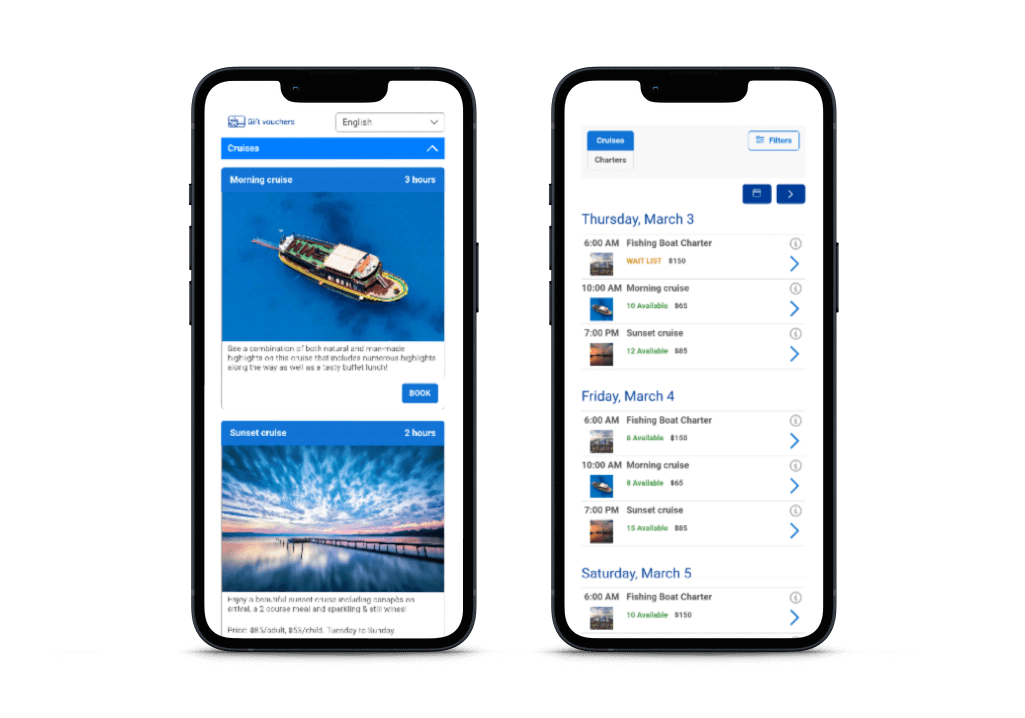
4. Maximize client retention with nurturing campaigns
Above, we have discussed the importance of keeping the right balance of efforts between acquiring new clients and retaining existing ones and how in many cases, the latter can be much more profitable.
The effort to prioritize and retain existing clients must start as early as possible in the client’s lifetime, and here is a step-by-step how:
- Step 1: educate and inform so that your clients know about all the services and products you are offering, and your capabilities
- Step 2: continue improving your services, delivery, onboarding process, and follow-ups. You have to show your clients that you are continuously improving. Collect and listen to clients’ feedback, and make improvements accordingly
- Step 3: nurture your clients, especially via email newsletters and social media. Check-in regularly and post updates, and share useful information via email newsletter. Encourage conversations on social media by asking them how things are going.
- Step 4: keep delighting them by sending thank-you notes, birthday gifts, and celebrating milestones. Invest your time—even if it’s just a few minutes— to send simple notes of encouragement.
5. Effective social media and influencer marketing
It’s quite obvious that we should market any business on various social networks in this social media age.
The question is, how to get our voice heard amidst all the noises and saturation?

First, it’s important to choose the social networks you’re going to focus your efforts on. Facebook, Instagram, Twitter, LinkedIn, TikTok, Pinterest, and YouTube are the most popular social platforms at the moment, each with different types of users.
Identify who your target clientele is, and figure out the social platform(s) they frequent.
We basically have three main options when it comes to social media marketing:
- Organic: building your own followers and regularly posting your content. This is the most affordable option and can be totally free. However, building an organic social media presence can take a long time.
- Paid: using various paid advertising options (i.e., Facebook ads, Instagram ads, etc.) to promote your business. These paid options virtually guarantee short-term results, but they can be very expensive if you are not careful.
- Influencer: partnering with the right influencers so they can help promote your boat charter business to their followers. We’ll discuss more of influencer marketing below.
Effective influencer marketing for boat charter businesses
Influencer marketing is popular at the moment for one simple reason: it’s highly effective. Today’s consumers simply trust recommendations from influencers more than traditional advertising, so you should leverage this to your advantage.
Partnering with the right influencers can help you in selling experiences (i.e. tour destinations, yachting experiences) to your target audience while also building authentic relationships, and positioning themselves as a trusted resource for your target audience.

So, how can you leverage influencer marketing to promote your boat tour or yacht charter business?
Above anything else, the most important factor is to identify which influencer(s) to work with, and you have several main options:
- Industry experts and thought leaders: who are the relevant names that people trust in your area when it comes to boat tour destinations, fishing, yachting, and other related services in the industry. These could be micro- or macro-influencers (including celebrities), but micro-influencers tend to be more cost-effective at the moment.
- Celebrities: if you do have the budget, and if there is any relevant celebrity in your area you can work with (that makes sense for the boat charter niche), then they can be very effective in amplifying your reach and generating fast results. Keep in mind, however, that they can be very expensive.
- Nano influencers: we can define nano influencers as those with between 1,000 and 10,000 followers, and leveraging nano influencers can be very effective for boat tours and charter businesses that rely on location. Find nano influencers with dedicated local followings and partner with them.
- Clients and employees with a strong following: probably there are employees or even clients with a strong enough following in your boat charter company. Encourage and probably incentivize them so they can help grow your company’s reach.
6. Referral program that works
Don’t underestimate the effectiveness of word-of-mouth marketing, even now in 2022.
The ultimate goal of any marketing campaign is to turn satisfied customers into advocates: those who willingly recommend your business and product/service to their friends, family, and followers.
A referral campaign essentially encourages artificial advocacy by offering incentives for your customers (or even non-customers) to promote your business.
You can either build a fully-fledged referral program with structured incentives, or you can start by sending gifts and referral cards to your best clients once or twice every year.

Besides your customers/clients and prospective clients, you may also consider seeking referrals from:
- Non-profit organizations in your area that serve your target audience
- Other local businesses in the area that are not in direct competition with your boat charter business but are targeting similar audiences.
The secret to a successful referral campaign is your reward or incentive: offering too little, and you may not be able to generate enough interest. On the other hand, offering too valuable of a reward may not only hurt your profitability, but may attract low-quality referral marketers who’d only want the reward rather than building authentic relationships.
So, take some time to figure out what reward is appropriate for a referral: commissions? Discounts? Free tour? Whatever your reward is, make sure it’s relevant and valuable for your target audience, so they’ll be attracted to participate.
Wrapping Up
If you own a boat/yacht charter or boat tour business and have been struggling to attract new clients (or retain existing ones,) we hope this list of marketing methods we have shared above can help you to improve your marketing efforts and grow your business.
While marketing a boat charter business can be challenging, it’s definitely possible to have a great marketing strategy as long as you know what you’re doing.
Above anything else, the secret to successful marketing—not necessarily for a boat charter business—is about understanding your target clientele. The better you can communicate how your business caters to your customers’ needs and answers their problems, the more likely you can win their attention and convince them to book your service.
Share This Post
- Share on Facebook
- Share on LinkedIn
Related Posts

Tired of messy spreadsheets and complicated scheduling software?
Schedule clients, process bookings and payments, automate repetitive admin tasks, and market your business – with Bookeo’s all in one intuitive scheduling system.
- Laguna Beach Independent Newspaper
- Laguna Beach City Guide
- Newport Beach Independent Newspaper
- Newport Beach Country Club Magazine
- Montage Magazine
- Omni Escapes Hotel Magazine
- Bespoke Concierge New York
- Evans Hotels
- Laguna Beach Magazine
- On The Menu Laguna Beach
- Newport Beach Magazine
- Coastal Real Estate Guide (NB,LB, CDM)
- Monarch Beach Resort Magazine
- Pacific Coast Magazine (SoCal)
- Sea Island Life Magazine
- Salamander Hotel & Resorts Magazine
- View our entire portfolio
- Art & Culture (70)
- Business (910)
- California Hotel Listings (9)
- Daily Updates (1)
- Editor's Choice (291)
- Education (6,570)
- Featured (465)
- Finance (893)
- Food & Dining (128)
- Health & Fitness (296)
- Human Interest (569)
- Insurance (208)
- Lawyers (358)
- Marketing (311)
- Medical (358)
- Newsletter (325)
- Opinion (131)
- People (727)
- Popular (270)
- Real Estate (280)
- Social Media (288)
- Technology (927)
- Uncategorized (336)

California Business News, California News Media, California business articles | Orange County, Los Angeles, San Diego, Inland Empire, Northern California, San Francisco California Business Journal Huntington Beach, CA 92649 (949) 648-3815 ALL RIGHTS RESERVED BY: CALIFORNIA BUSINESS JOURNAL. Site Design by 1REALTOUR
Understanding Yacht Chartering Costs: A Comprehensive Guide

Imagine sailing the open seas, surrounded by azure waters, and basking in the luxury of a private yacht. Yacht chartering offers a unique and exhilarating experience, but it’s essential to understand the costs associated with it before embarking on this adventure. In this comprehensive guide, we will break down the various expenses involved in chartering a yacht, from the base charter rates to additional fees and seasonal price variations. We’ll also provide you with valuable tips on how to budget effectively for your dream yacht charter.
Base Charter Rates
The base charter rate is the starting point for calculating the cost of your yacht charter. This rate typically covers the rental of the yacht itself for a specific duration, which can range from a few days to several weeks. The base charter rate varies widely depending on several factors:
- Yacht Size and Type: Larger and more luxurious yachts come with higher base charter rates. Motor yachts are generally more expensive than sailing yachts due to their higher operational costs.
- Yacht Age and Condition: Newer yachts in excellent condition command higher charter rates than older vessels.
- Location: The location of your charter significantly influences the base rate. Popular destinations like the Mediterranean, the Caribbean, and the Bahamas tend to have higher prices and local taxes.
- Time of Year: Peak chartering seasons in specific regions can lead to higher base rates. For instance, the Caribbean can be more expensive during the winter months when the weather is ideal.
- Duration: Longer charters may offer lower daily rates compared to shorter ones.
- Inclusions: Some charters include additional amenities such as water toys, scuba equipment, or a chef. These extras can impact the base rate.
Additional Fees
Understanding the additional fees associated with yacht chartering is crucial for budgeting effectively. These fees can significantly impact the total cost of your charter:
- Fuel: Yachts consume fuel, even sailing yachts, and you may be responsible for covering these costs. Fuel expenses can vary depending on the yacht’s size, distance traveled, and usage of amenities like air conditioning and water sports equipment.
- Crew: Most charter yachts come with a crew that includes a captain, chef, or possibly a stewardess, and deckhand. The crew’s salaries and gratuities are usually included in the base rate, but it’s customary to tip them, often around 15-20% of the base charter rate.
- Provisions: You may need to budget for food and beverages during your charter. You can either purchase your provisions locally or opt for a fully provisioned charter, where the crew stocks the yacht with your preferred items.
- Dockage and Marina Fees: When you choose to dock at marinas or ports, you’ll incur fees. These fees can vary widely, and the more popular the destination, the higher the costs.
- Taxes and Permits: Some regions may require specific permits or impose taxes on yacht charters. Be sure to inquire about these expenses before booking.
- Communication and Entertainment: If you require internet access or want to use satellite TV, you may have to pay extra for these services.
- Optional Extras: Water sports equipment, scuba diving, and excursions are often available for an additional fee.
Seasonal Price Variations
The time of year you choose for your yacht charter can significantly affect the overall cost:
- High Season: The high season typically corresponds to the best weather conditions in a given region. Charter rates are at their peak during this time, so expect higher prices.
- Low Season: Chartering during the off-peak season can yield cost savings. However, be prepared for less predictable weather.
- Shoulder Season: Consider chartering during the shoulder season, which falls between the high and low seasons. You may enjoy good weather and more reasonable rates.
Tips for Budgeting
Here are some tips to help you budget effectively for your yacht charter:
- Set a Clear Budget: Determine your total budget, including the base charter rate, additional fees, and discretionary expenses. Stick to it to avoid overspending.
- Plan Ahead: Book your charter well in advance to secure better rates and availability, especially during peak seasons.
- Opt for Inclusive Packages : Fully provisioned or all-inclusive charters can simplify your budgeting by covering many expenses upfront.
- Be Mindful of Crew Gratuity: Factor in the crew’s gratuity when planning your budget. It’s a significant expense and a customary practice.
- Consider Trip Insurance: Trip insurance can protect you from unforeseen circumstances and potential additional costs.
- Review the Charter Agreement: Thoroughly review the charter agreement to understand what is and isn’t included in your charter rate.
Yacht chartering can be an unforgettable experience, and understanding the costs involved is essential to ensure a stress-free journey. By considering base charter rates, additional fees, and seasonal price variations, and following our budgeting tips, you can embark on your yacht charter adventure with confidence, knowing that you’ve planned for a seamless and enjoyable voyage on the high seas. Happy sailing!
Get a Quote
Are you ready to let us show you what we can do for you? We can’t wait! This is as exciting for us as it is for you. We began this business because we love putting the perfect yacht charter together for our clients and getting the best of the best at the right price point thanks to our contacts and experience.
Use our quick contact form to give us the basics about what you’re looking for and we’ll send you ideas and pricing. Don’t worry if it’s not grand enough or should be scaled back; we’ll take care of that too. When you love the plan, we put it into action. All you have to do is show up and enjoy.
More Vacation Tips

Why a Yacht Charter Is the Ultimate Vacation Experience

Top Tips for Packing for a Yacht Charter Vacation

Top Anchorages and Beaches in the British Virgin Islands for Yacht Charters

Superyacht Sales, Charter, Construction & Management
Yacht Sales, Charter, and Construction Experts
Moran Yacht & Ship is proud to be considered one of the world’s best yacht companies; a leader in luxury yacht sales, construction, charter, and management. Whether you are interested in buying a yacht , selling your yacht , luxury yacht charter , or new yacht construction , our super yacht brokers and yacht managers are here to assist. Family-owned and operated, our luxury yacht brokerage has been the preferred choice for yacht buyers, sellers, and charterers for over three decades.
Featured Yachts For Sale
Interested in buying? Moran is proud to have the most impressive fleet of all the world’s brokerage companies. With over three decades of experience in yacht sales and purchase, along with countless time spent at sea, our knowledgeable luxury yacht brokers will guide you through the process of purchasing or selling a yacht. Learn more about our featured luxury yachts for sale here.

Our Approach
Our experience is what sets us apart from other yacht companies. The Moran team is made up of marine industry experts, including veteran Captains and engineers, meaning that we are uniquely positioned to provide world-class superyacht services. Our team’s wealth of luxury yacht knowledge is what first draws people to us, while our straightforward approach is what keeps clients coming back time and time again. We Do What We Say, honoring our promises and commitments to clients and fellow brokers above all else. By providing honest, specialist, yet unbiased advice to everyone who passes through our door, we maintain an extraordinarily high rate of repeat business.
Featured Yachts For Charter
Want to charter or know more about how to charter a yacht ? Moran Yacht & Ship is considered one of the very best yacht companies in the world for luxury yacht charter , with an expert team who will always go the extra mile to provide you with the right itinerary, vessel, and superyacht crew . Learn more about our featured luxury yachts for charter here.

LADY KATHRYN V

Integrity and the relentless pursuit of the deal defines Moran Yacht & Ship - I am grateful that you were on this journey with me. This magical machine KISMET is the second yacht I’ve had built with Moran Yacht & Ship. KISMET has brought joy, hope, and the gift of discovery to many lives - including my own. You have made this world a better place! Owner, KISMET
By way of background, my business interests include controlling stakes in 3 publicly traded companies which operate vessels in the 500 to 5000dwt range. On average, one new vessel a year would be added to the fleet. As a result, I have access to in-house marine architects, engineers and construction supervisors. Consequently, when I decided to build my first large motor yacht, I did not feel I needed the services of a company like Moran Yacht & Ship. In any event, I was persuaded to let them negotiate on my behalf while I simultaneously held discussions with other building options. Moran Yacht & Ship understands yachts, their incredibly complex systems, and what constitutes a practical solution to various owners’ ideas. In short, I would not consider building another yacht without engaging Moran Yacht & Ship to provide the services they are so good in delivering. Former Owner, NORTHERN STAR
Latest Yachting News
Want to find out what we’ve been up to? View our latest yachting news, including recent yacht sales, price reductions, and completed custom yachts . Offering a full selection of yachting services, the Moran Yacht & Ship team is always busy working on our next big project. Discover our latest updates here.

15% Discount on New England Charters Aboard UTOPIA IV

Dining Michelin-Style in the Mediterranean Part 2

Dining Michelin-Style in the Mediterranean: Part 1

FAQ’s About Yacht As A Business Ownership and Tax Advantages

Many of your questions and doubts will be answered in this list but if not, please feel free to give us a call or email us. Also read the article explaining Yacht Business Ownership in more detail.
| Should I Own The Yacht Personally Or Through A Corporation?
It is better to own the yacht in a corporation because it reduces personal liability. It is a smart thing to do when running the yacht as a business where it will be for charter. If you place the vessel in an LLC the tax benefits flow through to you personally.
| Can I Legitimately Take The Tax Deductions?
If you are actively involved in the business and meet the IRS tests for active participation then it is a business and you can legitimately take the deductions and benefit from it. You need to show active participation as well as the ability and the intent to make a profit.
| What Type Of Active Participation Is Required?
The most common test is that the owner does a minimum of 100 hours and more than any other one person. If you do a website, attend trade shows, do familiarization trips and technical inspection of asset directly related to your business, you will log far more than 100 hours.
| How Do I Meet The Requirements?
In the course of running the business:
- Attend a trade show such as the Annapolis trade show where the yacht is promoted for charter, you would easily and legitimately log 50 to 75 hours.
- Apart from the chartering component of the business where the LLC (sub contractor) generates income through the charter company (general contractor) there are other income streams for the LLC such as charter sales where the LLC earns commission from charters sold on its own yacht, as well as other yachts in the fleet.
- To be effective and facilitate the sale of charters, the owner would need to do “familiarization” trips to have good knowledge of the product being sold which is the cruising ground (this is much like a travel agent who travels to destinations that they promote and sell packages into).
- One familiarization trip per year would log a minimum of 50 to 100 hours. It is also reasonable to have an annual inspection of the asset, which would require traveling to where it is located, again this would log 50 to 75 hours at the very minimum.
| Will Doing This Trigger An IRS Audit?
There is always the chance of an audit when a large deduction is generated, if proper records are kept and the owner does actively participate with the intent to make a profit then the standard is met and should satisfy scrutiny. Your CPA is the best person to answer this question because personal circumstances differ from person to person.
| What Amount Of Money Must I Put Down To Get Into The Program?
The deposit required by most lenders is 20 % so the cash out would be 20% of the full purchase price plus two months of mortgage payments in the Guaranteed program and two months of mortgage payments plus the insurance premium (1.5% of hull value) in the performance program.
| Is The Boat Insured During The Program And How Am I Protected?
The boat has comprehensive insurance in the name of the owner or the LLC from the time the keels touch the water. If there is a loan the lender is recorded as the first loss payee and DYC is noted on the policy for charter operations. The deductible is covered by an additional insurance policy that the charterer pays, so the owner has no exposure to a deductible unless they cause the damage themselves.
| What Tax Reporting Is Required?
Your CPA will be able to answer this but generally the LLC would generate a K1 which would be incorporated into the tax return
| Do The Tax Advantages Flow Through To Me Personally?
Yes they do.
| Is There Recapture On The Tax Advantages When I Sell The Boat?
Yes, there is if you sell the yacht outright at the end of the program and the rate is at ordinary income. If you keep the vessel for personal use after the program than this should not be an issue but check with your CPA for your personal situation. The third alternative is to trade the yacht is and do a “like kind” exchange in which case there is no recapture.

Common Misconceptions About Running a Boat as a Business
| putting a yacht into charter is a passive activity like rental property.
Wrong, if you put the vessel into a Corporation and run it as a business and ensure you meet the relevant standards and tests then it is a small business and is taxed accordingly. Note, that if you go into a guaranteed income program where you sign a long term management agreement and receive a monthly guaranteed income, then this is passive activity and you will not be allowed to generate tax advantages save and except if you have passive losses that you can be offset against passive income.
| You Need 500 or 700 Hours Of Active Participation To Qualify
No, the test most commonly used is ” a minimum of 100 hours and more than any other one person”. You will find that the US staff and base staff, who all have different tasks, will never spend more time on your boat individually than you will in a given year. Remember that the trade shows, familiarization trip, asset inspection trip, marketing, contract negotiation (we renegotiate the contract each year) would result in close to two hundred hours of active participation not to mention that all costs are also deductible.
| You Will Automatically Trigger An Audit
Unlikely that an audit is automatic, this is not the experience we have over the last eight years. The issue is to meet the tests and standards and ensure that you are in compliance with the rules. This is not for everyone but if scrutinized and everything is in order then it is unlikely that it would proceed to an audit.
| You Have To Make A Profit Three Out Of Five Years To Avoid “Hobby Loss” Rules
The rules state that if you make a profit three out of five years then hobby loss cannot be applied. To be clear, you DO NOT HAVE to make a profit three out of five. Many CPAs make this statement, which is not entirely accurate as it is interpreted the wrong way. The actual rule is that you have to have “the Ability and the Intent” to make a profit which is clearly the case here.
| A Yacht Does Not Qualify For Tax Advantages
The yacht is equipment that is being purchased and placed into service in a small business that has the ability to make a profit if well run which is the intent. The same rules would apply to the owner of a dump truck who sub contracts to a general contractor, there is fundamentally no difference. The truck would qualify for section 179 and Bonus Depreciation if purchased new. The owner would be actively involved even if there is an employed driver because of contract negotiations, marketing admin etc. and the intent is also to make a profit.
| You Cannot Use The Yacht While It Is In The Program
You can use the yacht. It is generally agreed between most CPA’s who are familiar with the program that 10% of private use by the owner over and above the familiarization and asset inspection trips, is acceptable.
For More Information About Yacht Business Ownership And Tax Advantages, Contact Us
Estelle Cockcroft
Join our community.
Get the latest on catamaran news, sailing events, buying and selling tips, community happenings, webinars & seminars, and much more!
Leave a Comment Cancel Reply
Your email address will not be published. Required fields are marked *
Save my name, email, and website in this browser for the next time I comment.
Recent Posts

Top 10 Reasons to Sell (and Sail) Your Catamaran in Texas
Our Texas Office is located in the Watergate Marina Center in Clear Lake Shores,

Annapolis Boat Show 2024
Meet with our team! Want to learn more about the Bali and Catana

Exploring the Catana OC 50 Catamaran: A Comprehensive Overview
The Catana OC 50 Catamaran, the latest addition to the Catana Ocean Class series,

Lessons Learned from Selling our Catana 50 OC
Stephen and I are in the process of selling our Catana OC 50 Catamaran.

For more than 30 years, we have been a part of the catamaran community and created Catamaran Guru™ to encourage and educate all the aspiring sailing out there. We understand the dream of traveling the world by catamaran and created a one-stop-shop to make that dream a reality for you.

- Stephen & Estelle
- Testimonials
Get Started
- Yacht Sales
- Used Yachts
- Charter Management
- Boat as Business Programs
- Seminars & Events
Yacht Charter Moscow - Yacht Rentals Moscow
Top-rated yacht charters in moscow - preselected yacht rentals:.

Yacht Elegance 64 for rent in Khimki Marina
- Elegance 64 [Yacht Price incl. Taxes]
- Dinghy with engine
- Skipper (food not included)
- Fuel consumption
- Yacht Insurance
- Final cleaning
- Tourist tax
Using this site requires JavaScript. You are either using a browser that does not support JavaScript or has JavaScript disabled. Please click here for detailed information.
Sign up and
GET 20% OFF
Your first boat rental
Welcome to Sailo !
Your code is:
Enjoy 20% off
- Explore boats
- Text (910) 447-2456 Call (910) 447-2456
Departure date
Trip duration, multiple days (less than 1 week), weekly trip show boats that have weekly prices. most weekly boats outside of the us are available only saturday to saturday., boat length: 5ft -, manufacturer, boat build year: -, weekly trip, price: $ - $, no boats found, to see more results try changing your dates, moving the map, or removing your filters, renting a yacht is the best way to discover moscow, russia, learn how to find the right boat for great yachting experiences, how much does it cost to rent a moscow, russia boat for a day, will i be charged a security deposit for my sailo charter, because we love the ocean.
- Don’t litter or throw waste overboard - take rubbish home and dispose of it responsibly
- Eco-friendly sunblock can help prevent damage to marine life
- buy local and sustainable food products
- FAQ and Policies
- Accessibility Statement
- Boat Rentals
- Boat Calculator
- Discover Boating
- Community questions
- Referral Program
- British Virgin Islands
- La Paz, Mexico
- Cabo San Lucas, Mexico
- Key Largo, FL
- St. Vincent and Grenadines

16 Yacht Charters That Make for a Strangely Affordable Family Vacation

Patriot Charters

Location & Hours
Suggest an edit
2803 Emerson St
San Diego, CA 92106
Fleetridge, Point Loma
You Might Also Consider

Samurai Sport Fishing
0.01 miles away from Patriot Charters
5 pack & 12 person fishing charter out of San Diego, CA targeting Blue fin tuna and other pelagic species! 6-12 hour trips-our vessels get you to the fishing grounds fast & have been outfitted as tuna slaying machines! Our fleet… read more

Guardian Charters
2.1 miles away from Patriot Charters
Blair P. said "So I was able to get in touch with Evan (the owner) about the situation. He had a legitimate reason to not get back with me. He listened to my story about my experience and understood. He offered a refund which I declined and…" read more

Triton Charters
0.2 miles away from Patriot Charters
Welcome to the largest and newest catamaran experience in San Diego! Triton offers ticketed San Diego bay cruises, private charters for birthday parties, corporate events, and even special events for holidays! read more
in Boat Tours, Boat Charters, Boating
Recommended Reviews
- 1 star rating Not good
- 2 star rating Could’ve been better
- 3 star rating OK
- 4 star rating Good
- 5 star rating Great
Select your rating
Overall rating

Once awhile you find the perfect fit! Patriot Sportfishing Charters fits the bill..... Luxury fishing aboard an incredible yacht (18' beam) with a Chef and a Professional Angler not to mention 2 amazing Captains Greg & Trevor. They along with the capable deck hands give you the experience of a lifetime. They did for me catching a 190 BlueFin on the Kite, my personal best. Did I mention the food, Landen is a culinary Chef who we dine with. Yes, dining on a Sportfisher 60 miles out, sometimes in some pretty rough seas. Sleeps comfortably 12 customers with a great shower and head that even the Ladies will love. Fresh linens and heavy comforters for an enjoyable nights rest and plenty of space to have a poker game. This is Michelin 5 Star Fishing for everything from 200 lb tuna to limits of delicious Calico Bass. Just bring an overnight bag with some clean clothes just in case you get bloody. I'm a 100% handicapped and they took care of my every need and desire. Great rigged tackle of EVERY style of fishing imaginable and the Professional Chris Schitt has huge credits for leading teams to major jackpots in the World. The man can catch fish! Safety is mandatory and the Captain's are serious about making sure your safe. PLUS they know where to go!

See all photos from Steven C. for Patriot Charters
Me and my family had the best time aboard The Patriot! The crew was incredibly friendly and knowledgeable! The food and service were impeccable! Words can't express how great of a time me and my family had! Can't wait to book another trip with them again! Thank you Trevor, Chris, Landon, Brandon, and Greg for giving us the trip of a life time!

Seasport Divers
Michael S. said "My wife and I, being on our honeymoon wanted to take in some of the underwater sea life while we were in Kauai. We were strongly pointed in the direction of Seasport Divers. I am certified open water diver with 100+ dives, my wife…" read more
in Boating, Diving, Boat Charters

Lucky Sol Sailing
1.2 miles away from Patriot Charters
Misty F. said "Seriously, the very best possible way to end our week-long trip in SD. From reservation to trip-end, Jason was incredibly professional and knowledgeable. We had such a relaxed and beautiful sail. Seeing the sea lions was amazing and…" read more
in Sailing, Boat Tours, Boating
People Also Viewed

Islander Charters Incorporated

Condor Sportfishing

Captain James Nelson - Fishing Guide

World Class Shark Fishing

Cobalt Sport Fishing

Panga Charters

Bon Voyage Charter

Monaco Bay 007

Dive Guy Charters

Luke Brown Yachts
Best of San Diego
Things to do in San Diego
Browse Nearby
Bait and Tackle Shop
Restaurants
Things to Do
Campgrounds
Sunset Cruise
Whale Watching
Other Places Nearby
Find more Boat Charters near Patriot Charters
Find more Fishing near Patriot Charters
Related Cost Guides
Boat Charters
Boudoir Photography
Bounce House Rentals
Event Photography
Valet Services
Videographers
Jeff Bezos has hosted Bill Gates, Ari Emanuel, and other business tycoons and celebrities on his stunning $500 million yacht
- Jeff Bezos' megayacht has played host to several celebrities since setting sail last year.
- Bezos and his fiancée, Lauren Sánchez, held their star-studded engagement party on the yacht in 2023.
- There are some of the big names who have boarded Koru.

Jeff Bezos' megayacht has only been sailing on the open seas for a little more than a year, but the $500 million spectacle has already wracked up an impressive guest log of A-list visitors.
The Amazon founder has hosted fellow billionaires , reality TV stars, and Academy-award winners on his 417-foot vessel.
Here are some of the big names who have enjoyed Koru alongside Bezos.
Bezos did not respond to a request for comment from Business Insider.
Leonardo DiCaprio
Hollywood hotshot Leonardo DiCaprio is a repeat sailor on Koru.
Bezos hosted an August 2023 party aboard the yacht to celebrate his engagement to Lauren Sánchez, and DiCaprio was in attendance, Page Six reported at the time.
DiCaprio was back on the big boat earlier this month, but this time, he was joined by his 26-year-old girlfriend, Vittoria Ceretti, according to the tabloid .
Representatives for DiCaprio did not respond to BI's request for comment.
Katy Perry and Orlando Bloom
Katy Perry and Orlando Bloom enjoyed an Italian summer while sailing on Koru earlier this month.
The singer-actor couple were both in attendance at Sánchez's 50th birthday party in 2019, according to Page Six.
Perry and Bloom also joined Bezos and Sánchez in Croatia last year , as did Usher.
The "Woman's World" singer and her "The Lord of the Rings" partner were back on Koru with Bezos, Sánchez, DiCaprio, and Ceretti this month, Page Six reported.
Representatives for Perry and Bloom did not respond to BI's request for comment.
Microsoft founder and billionaire Bill Gates enjoyed Koru's amenities when he attended Bezos and Sánchez's August 2023 engagement party.
Gates was accompanied by his girlfriend, Paula Hurd. The couple was spotted in paparazzi photos lounging on the yacht's deck.
Representatives for Gates did not respond to BI's request for comment.
Kim Kardashian and Kris Jenner
Multiple members of the famous reality TV family have hitched a ride aboard Koru.
Kim Kardashian spent time on the megayacht with Bezos and Sánchez earlier this summer as Koru traversed the Aegean Sea near Greece, People reported.
The SKIMS founder's mother, Kris Jenner, and her boyfriend, Cory Gamble, were also on board earlier this month, according to the outlet.
Jenner also attended Bezos and Sánchez's August 2023 engagement party on Koru. The Kardashian matriarch posted a photo of herself sitting next to Sánchez celebrating the engagement.
Representatives for Kardashian and Jenner did not respond to a request for comment from BI.
Wendi Murdoch
Entrepreneur and investor Wendi Murdoch snagged an invite to Bezos and Sánchez's 2023 engagement party aboard Koru, Page Six reported at the time.
Rupert Murdoch's ex-wife was photographed on the yacht in conversation with Gates.
BI reached out to Murdoch for comment.
Whitney Wolfe Herd
Bumble co-founder and billionaire Whitney Wolfe Herd was among Sánchez's female friends who helped celebrate her engagement on Koru last year, BI previously reported.
Herd appeared in photos on Sánchez's Instagram from August 2023.
BI reached out to Herd on Instagram for comment.
Ari Emanuel and Sarah Staudinger
Fashion designer Sarah Staudinger and her husband, Ari Emanuel , CEO of entertainment agency Endeavor, also attended the star-studded engagement party last year.
Staudinger appeared in photos on Sánchez's Instagram presumably taken on Koru from around that time.
Emanuel did not immediately respond to a request for comment. BI was unable to reach Staudinger for comment.
Tobey Maguire and Andrew Garfield
The two Spiderman actors reportedly attended Bezos and Sánchez's engagement party on Koru last August, Page Six reported at the time.
Representatives for Maguire and Garfield did not respond to BI's request for comment.
Rania Al Abdullah (The Queen of Jordan)
Queen Rania of Jordan was also a reported guest at Bezos and Sánchez's 2023 engagement party, according to Page Six.
BI reached out to Queen Rania's foundation for comment.
- Main content

COMMENTS
Discover essential steps to launch a yacht charter business, including licensing, market analysis, and fleet management. Ideal for maritime entrepreneurs.
Starting a boat charter business is easier than you think—especially with Boatsetter. Learn how to start a charter business, including yacht or fishing charters.
Ever dream of starting a charter boat business? If so, stop dreaming and read our highly practical guide to the steps you need to take.
Yes, owning a yacht for charter can be profitable but owning a yacht will rarely "pay for itself.". Chartering your yacht presents some unique benefits that can lead to opportunities to make a profit off of your investment in a myriad of ways, including offsetting the cost of owning a yacht, selling your yacht for a profit, and even making ...
Set sail with a charter boat business; navigate through licensing, vessel selection, safety protocols, and tips for a memorable customer experience.
The business of chartering a yacht comes with many responsibilities. Not only do you have to establish a plan of action for servicing your clients, you also need to cover your assets. Review the following list of steps if you are interested in learning how to start a yacht charter business.
Set your catamaran up in a Boat As A Business program to offset costs of yacht ownership through revenue and significant tax advantages.
Starting a yacht charter business sounds appealing - spending your days on a luxury yacht, cruising to exotic locales, and hanging out with "the rich and famous".
Offering your luxury yacht for charter allows you to generate revenue from charters while still cruising aboard at your leisure. Northrop & Johnson's impressive charter fleet comprises the world's most opulent luxury yachts, overseen by experienced professionals dedicated to ensuring maximum bookings and exposure for your luxury yacht.
Grow your charter boat business with these 12 tips for building a business plan that encompasses marketing, customer service & pricing.
When starting a new yacht charter business, establish a network of people in the tourism industry. Forge strong business relationships and you will enjoy many benefits.
Thinking of starting a boat charter business? Learn the basics to build a profitable business that can afford you a rewarding lifestyle on the sea.
Experience the thrill of sailing with the world's premier yacht charter company. We offer a variety of charter options in the world's best sailing grounds.
Learn six of the most effective marketing strategies for boat tour and yacht charter businesses and the best practices to maximize results.
When you set your yacht up as a business, you get income and tax advantages. The great thing about the programs we select compared to a standard charter company plan is that you only need a few weeks of charter income combined with tax advantages to cover 80-100% of costs. You don't need to charter excessively and have your boat get the wear ...
In this blog, we will discuss everything you need to know about yacht charters, from the different types of yachts available to important safety tips. Planning Your Itinerary. When planning your yacht charter, your itinerary is very important. It helps you decide where to go and what to do during your trip.
Understanding the additional fees associated with yacht chartering is crucial for budgeting effectively. These fees can significantly impact the total cost of your charter: Fuel: Yachts consume fuel, even sailing yachts, and you may be responsible for covering these costs. Fuel expenses can vary depending on the yacht's size, distance ...
Work with one of the best brokerage companies: Moran Yacht & Ship is a leader in luxury yacht sales, yacht construction, yacht charter, and management.
Thinking about starting a boat rental business? Use our 11 steps to help you get started. Start a Boat franchise.
The base charter fee in essence refers to the hire cost of the yacht itself, with all equipment in working order in addition to the cost of food and wages for the crew during the entirety of the charter. This is essentially all the base charter fee covers with additional expenses often applicable on top. The base charter fee will vary from one ...
Apart from the chartering component of the business where the LLC (sub contractor) generates income through the charter company (general contractor) there are other income streams for the LLC such as charter sales where the LLC earns commission from charters sold on its own yacht, as well as other yachts in the fleet.
Yacht Charter Moscow ⛵ Bareboat Charters & Crewed Yacht Rentals in Moscow ★ Rent a Yacht in Moscow Charter Boats & Charter Yachts in Moscow Skippered Yacht Charter, Crewed Yacht Rentals or Bareboat Charter in Moscow READY TO BOOK!
Which yacht to rent in Moscow Charter Fleet of Moscow and Moscow Region: what to choose and how much it will cost.
Choose a Sailo boat rental or yacht charter for your sailing vacations in Moscow, Russia! Looking for a sailboat, motor boat or catamaran rental? Get the best day or week-long experience on one of our boat rentals or yacht charters from Moscow, Russia!
A yacht may be the first thing that pops to mind when you think of the ultra-wealthy, but chartering one might not be as expensive as you thought.
2 reviews and 19 photos of PATRIOT CHARTERS "Once awhile you find the perfect fit! Patriot Sportfishing Charters fits the bill..... Luxury fishing aboard an incredible yacht (18' beam) with a Chef and a Professional Angler not to mention 2 amazing Captains Greg & Trevor. They along with the capable deck hands give you the experience of a lifetime.
Jeff Bezos' $500 million megayacht, Koru, has played host to several celebrities and business leaders since setting sail last year.